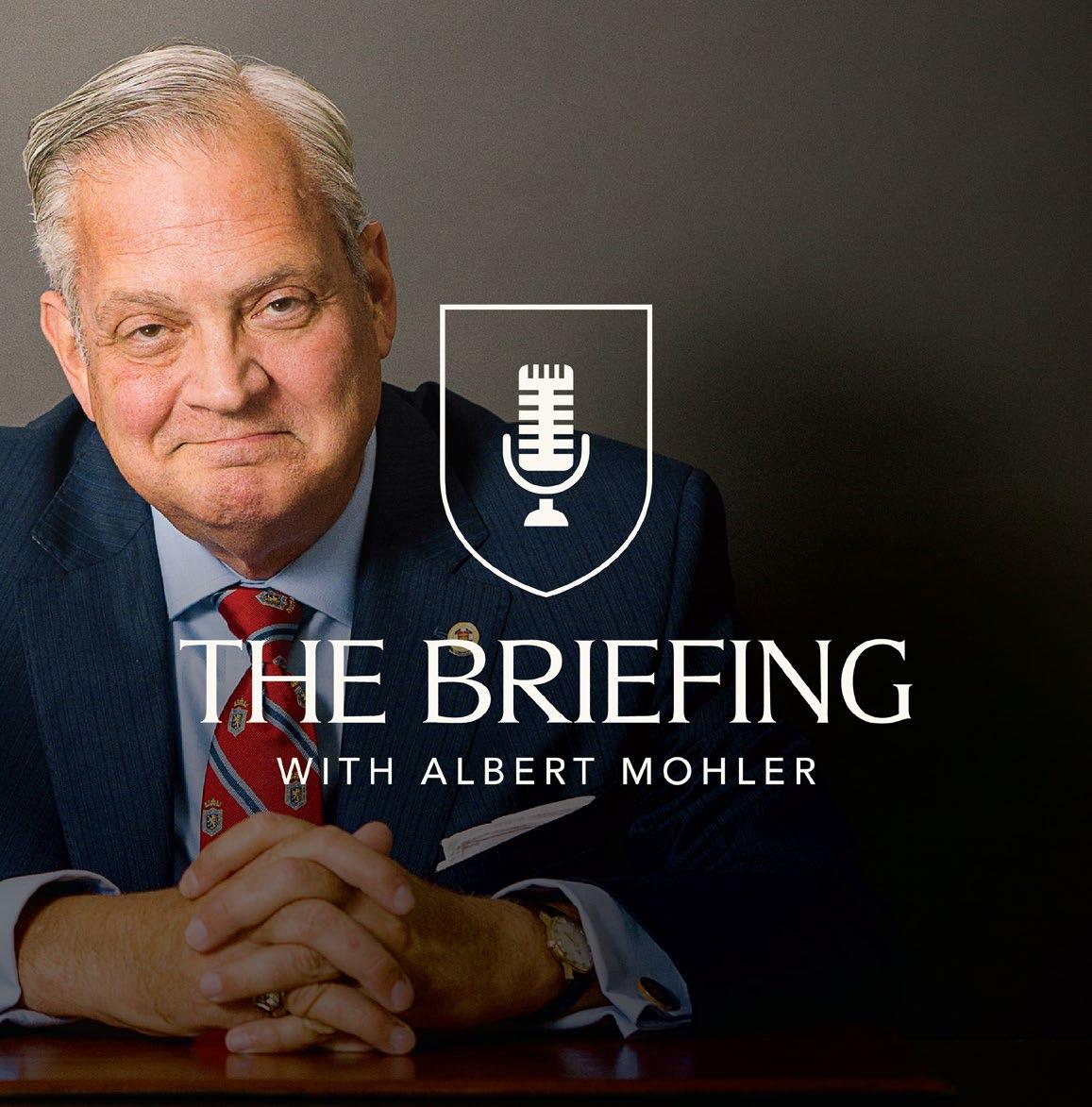15 Reasons to Recover the Centrality of Christ



15 Reasons to Recover the Centrality of Christ


Southern Seminary is proud to introduce our new online PhD in Christian Studies, tailored for ministry leaders and pastors who are passionate about both scholarship and practical ministry. This program provides a new opportunity to engage in rigorous academic study completely online. The PhD in Christian Studies combines the flexibility of online learning with the rigorous academic standards that Southern Seminary is known for, making it accessible to leaders worldwide.

he evangelical world was recently shaken by news of a moral scandal that took down a prominent preacher. This news hit like a bomb and came with great heartache and grief. How could this happen? How could this man do such a thing? Why did no one see it coming?
Sadly, it is a story as old as the Christian church. In truth, it’s even older – just think of King David. It happens because sin happens. As the Apostle Paul explained, sin will seize the opportunity (Romans 7:11). It happens because someone let it happen.
I recently spoke at a meeting of pastors where Pastor Crawford Loritts rightly offered the warning that any pastor or Christian leader is at all times less than “thirty seconds from stupid.” You bet we are. But the reality is that we are also thirty seconds from grievous sin and public scandal. That scandal will shake the foundations and hurt the faithful. As the New Testament makes clear, such a scandal brings disrepute upon the Gospel, the church, and the Christian ministry.
The world will make much of such a scandal, and it is often handed to them on a silver platter. Christians grieve and are confused. I had a quick conversation with two Boyce College students on the campus and they told me of their shared grief. I was asked by Southern Seminary students how we should respond to such troubling news. I was called by pastors and Christian leaders, some of whom has worked closely with this pastor and they often asked the same question: “Did you see this coming?” I was tempted to turn the question back on them: “Did you see this coming?” I didn’t see it coming and, to be honest, I am still in shock.
The correct Christian view seems to tell us that we should be shocked, for such sin is simply shocking and horrifying. On the other hand, the Bible clearly presents the reality of sin’s snares and the power of temptation
and the awful fact that leaders sometimes sin and fall. The Church of the Lord Jesus Christ, standing on Gospel and Scripture, knows that sin will happen and that the faithful church must confront sin for what it is.
Why do I take this painful subject as the substance for my letter in this issue of the Southern Seminary Magazine? It is because such a moral fall reminds us of what is expected of us as a Christian institution, those who lead here, those who teach here, those who serve here, those who study here, and those who go out from here to serve in the church and in the world. It also underlines the necessity of combining our deep concern for Christian conviction with an equal concern for Christian character. These dual concerns must undergird our leadership, our teaching, our life together, and our callings. All this serves to remind me of the massive and unavoidable stakes in this stewardship. Boyce College and Southern Seminary must seek in every way possible to produce men who, by God’s grace, are worthy of the pulpit. And we must do everything within our power to raise up a generation of men and women who will serve out their callings with conviction and character conjoined. Anything less is disaster. Look at how much is entrusted to us. Pray that we will be faithful to this trust in this generation and produce a generation who will perpetuate that faithfulness. Thank you for joining us in that stewardship. Let’s work even harder and pray even more fervently—for each other and for Christ’s church, in this generation and until our Lord returns. Even so Lord, come quickly.
R. Albert Mohler, Jr.
JACOB PERCY
In 1 Timothy 4:16, the Apostle Paul exhorts Timothy to “watch your life and doctrine closely” (NIV). This simple yet profound charge carries weight for every believer, but it is especially critical for pastors and church leaders. Paul’s words remind us that these two areas of our lives—our conduct and our doctrine—require constant, careful attention. What we believe shapes how we live, and how we live reflects the convictions we hold.
Later in 1 Timothy, Paul explicitly connects sound doctrine to godliness in 1 Timothy 6:3. He makes it clear that the pursuit of true doctrine is not merely an intellectual exercise but it is a spiritual discipline aimed at producing holiness in our lives. The call to “watch your doctrine” is not only about guarding against false teachings or theological drift— though these are important—it is also about ensuring that our doctrine, rooted in Scripture, drives us toward deeper faithfulness, obedience, and godliness. The end goal of sound doctrine is always greater love for God and others, a life transformed by the truth of God’s Word.
In today’s world, where truth is constantly challenged and distorted, this charge from Paul is more relevant than ever. Churches are faced with an onslaught of competing voices—many of which distort or outright reject biblical truth. In this environment, the church must hold fast to sound
doctrine. But this isn’t just the responsibility of scholars or theologians; it is a charge for every pastor, every church leader, and every believer. Doctrine shapes life, and it is through right doctrine that we are equipped to walk in righteousness, guard our hearts, and lead our churches in faithfulness to Christ.
In this edition of Southern Seminary Magazine, we explore these very issues. Our faculty has contributed five articles that seek to provide clarity on key theological doctrines, each with profound implications for the life of the believer and the health of the church. These articles cover essential topics, including the importance of holding fast to “the faith” once delivered to the saints, a biblical understanding of God’s judgment, the centrality of Christology, the work of the Holy Spirit, and the foundational nature of Trinitarian convictions.
Through these articles, we pray that you will be encouraged and equipped to examine your own life and doctrine more closely. As we seek to obey Paul's exhortation, may we be found faithful, holding firmly to the truth, and growing in godliness.
Fall 2024. vol. 92, no. 2.
Copyright © 2024
The Southern Baptist Theological Seminary
Vice President of Communications and Managing
Editor: Jacob Percy
Creative Director: Samantha Rice
Chief Style and Copy Editor: Torey Teer
Designers: John Zurowski and Anna Vanden Brink
Production Manager: Drew Watson
Photographers: Mark Schisler and Kelsie Keeter
Contributing Writers: R. Albert Mohler, Jr., Thomas Schreiner, Stephen Wellum, Gregg Allison, Kyle D. Claunch, Matthew D. Haste, and Travis Hearne
Subscription Information:
Southern Seminary Magazine is published by the Southern Baptist Theological Seminary, 2825 Lexington Road, Louisville, KY 40280. The magazine is distributed digitally at equip.sbts.edu/magazine. If you would like to request a hard copy, please reach out by emailing communications@sbts.edu
Mail:
The Southern Baptist Theological Seminary, 2825 Lexington Road, Louisville, KY 40280
Online: sbts.edu
Email: communications@sbts.edu
Telephone: (502) 897-4000

R. Albert Mohler, Jr.
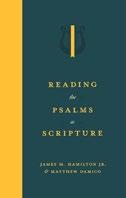
by Travis Hearne

Thomas Schreiner
Stephen Wellum
Gregg Allison
Kyle D. Claunch

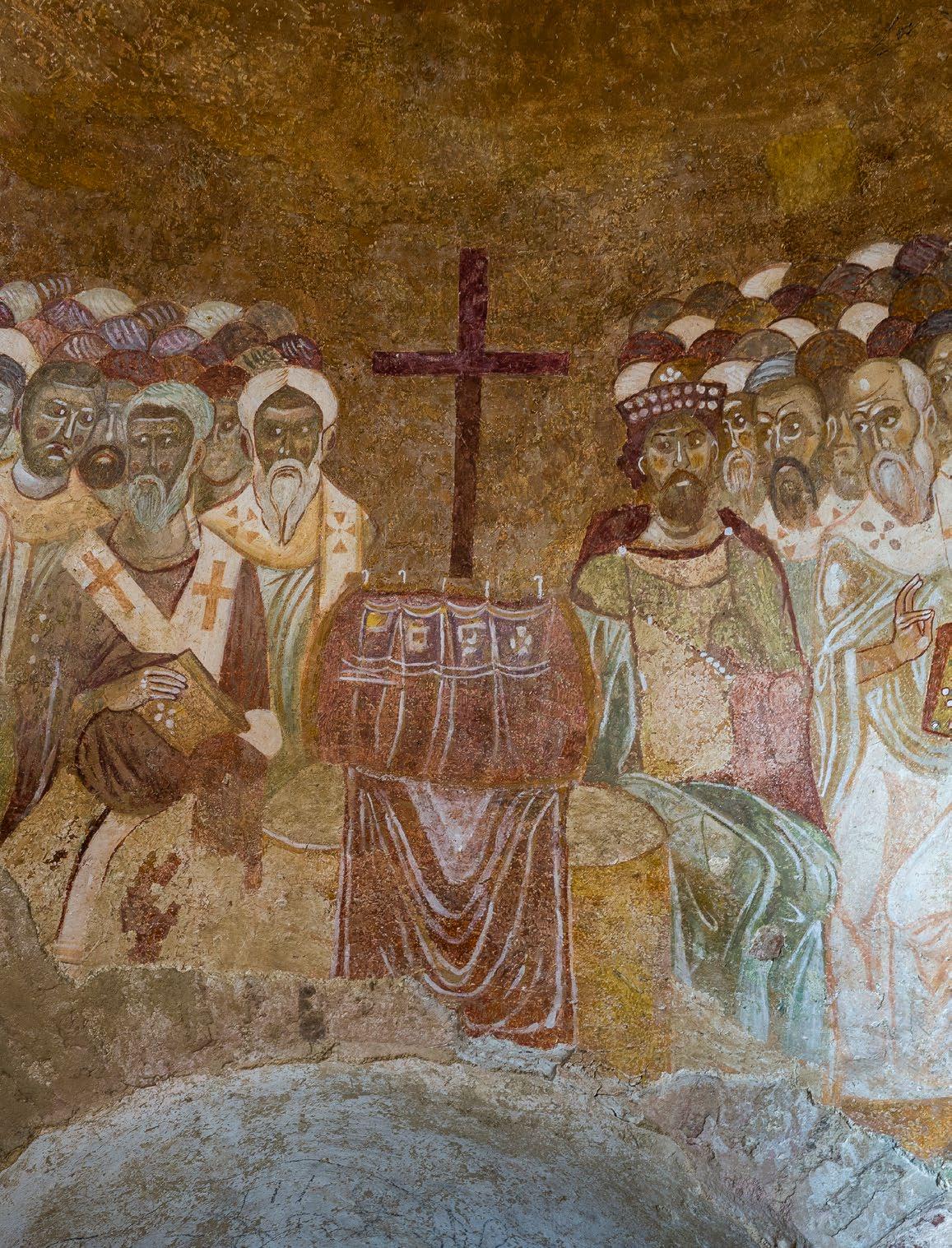
The church has always faced the question of how to deal with all the rival theological claims that arise. How is the church to answer in the face of theological challenges? Is there—as some have suggested—more than one Christian faith? Are there simply different christianities? Jude in his epistle answered the second question with a definitive no, and the first question with a call to contend for the one faith. He wrote: “Beloved, although I was very eager to write to you about our common salvation. I found it necessary to write appealing to you to contend for the faith once for all delivered to the saints.” (Jude 3) Jude wanted the congregation receiving this letter to be aware that there was an emphatic urgency that drove him to call the church to stand in the common faith, and to contend for this one faith.
In Jude’s day there were those who had come into the church preaching false doctrine and corrupting the common faith. Jude’s exhortation is, Rise and stand, the church is vulnerable, make it strong. The faith is being subverted, contend for it. Jude left no room for the church to simply adapt or allow for faiths to exist in place of the faith that was delivered. Instead, the saints were called to contend.
To contend is to be ready to make an argument. That requires an understanding that faithfulness, unity, and peace sometimes requires an intellectual battle. Sometimes this means appealing to the church to love the truth, hate error, and embrace and define the faith. Contending also requires a willingness to expose false doctrine. Your generation will depend on you to contend as every generation since the Apostles has.
Christians in pursuit of unity and peace, can feel an urge to shy away from contention. This is the right impulse if it keeps the believer from the sin of quarrelling. However, not all contention or debate is quarrelling. No Christian will be able to escape conflict if they are committed to true doctrine. At some point, you may be the only one in the room committed to Christ being of the same essence as the Father. At some point, you may be the only one in the room who says marriage is the lifelong covenant of one man and one woman. At some point, the contrast will be evident. In that moment, be prepared to contend for the faith.
Second, Jude says, the faith has been delivered once for all. Isn’t that liberating? Christians don’t have to wake up in the morning and wonder what Christianity we’re
supposed to read up on. We are not waiting for new orders for the day. But where was this one delivery? Was it Jesus’s teaching on the shores of Galilee? Yes, it was that. Was it the Apostles in the upper room? Yes, it was that. Was it Pentecost? Yes, it was that. Was it the church in Rome receiving the letter from Paul to Rome? Yes, it was that. There is great security in that. There are some who find security in a pope and a magisterium. There are others who define orthodoxy by the force of cultural winds. The Christian can do no such thing. Once for all delivered means we are not looking for the new and improved Christianity.
Third, the faith has been delivered. We did not call ourselves, we cannot keep ourselves, and we cannot deliver the faith. We are not waiting for any human to bring us the faith. We’re not waiting for any new authority to bring us the faith. It was delivered and that was once for all. It’s done. We are not waiting on a messenger from doctrinal headquarters. No angel is to be tolerated among us, who would say, “I’m bringing you a new doctrine.”
Fourth, the faith has been delivered, to the saints. It was delivered to us. Now for the faith to have been delivered to the saints means two things. First, the faith belongs to Christ’s church. It doesn’t belong to the world, the academy, or to the academic societies. It doesn’t belong to the Baptists or the Presbyterians or the Methodists. It doesn’t belong to the Orthodox or the Catholics. It belongs to the saints. And the saints are defined as those who are regenerate believers in the Lord Jesus Christ. Denominational titles are helpful insofar as they properly articulate the truth of the Scriptures in a particular theological boundary, but a title will not guarantee faithfulness if there are no longer believers under that heading. The Protestant Reformation was not an argument over branding, but over continuity with this faith. Secondly then, the saints are the ones who bear the responsibility to contend for this once delivered faith. It was delivered to the saints then to be protected. By implication of our one savior and faith it is also ours to contend for in our day. That means that we must be prepared for perennial and contemporary heresies.
In every day it seems Arianism is somewhere contending to be included in the faith. It is a perennial heresy that the church needs to address. Yet, the saints
also have to be constantly aware of the challenges that come unique to their time. Answering contemporary challenges is not evolution. Answers require new arguments and new language, but that is because the challenge is presenting new questions, not because there is a new faith.
I hope you share with me the great inexpressible joy of knowing that I do not bear responsibility for my own personal Christianity. I want to be found standing with Jesus and with the Apostles. I want to teach exactly what the Apostles taught the church. I want to teach exactly what Christ taught them. That will take each of us going back to Scripture continually and learning alongside people who love Christ and are determined to do the same. There is a great lineage of faithful Christians throughout the centuries doing just that. We want to stand in place as the next in line ready to contend.
This edition of Southern Seminary Magazine is one small part of that continual contending. I pray that it will build up your faith and encourage you to take up your place in your vocation contending. Believe more deeply. Contend more convictionally for our one faith, once delivered.

“I wrote this book to help Christians see and savor the imperishable glories of Christmas as we celebrate the birth of our own Savior.”
R. Albert Mohler, Jr.
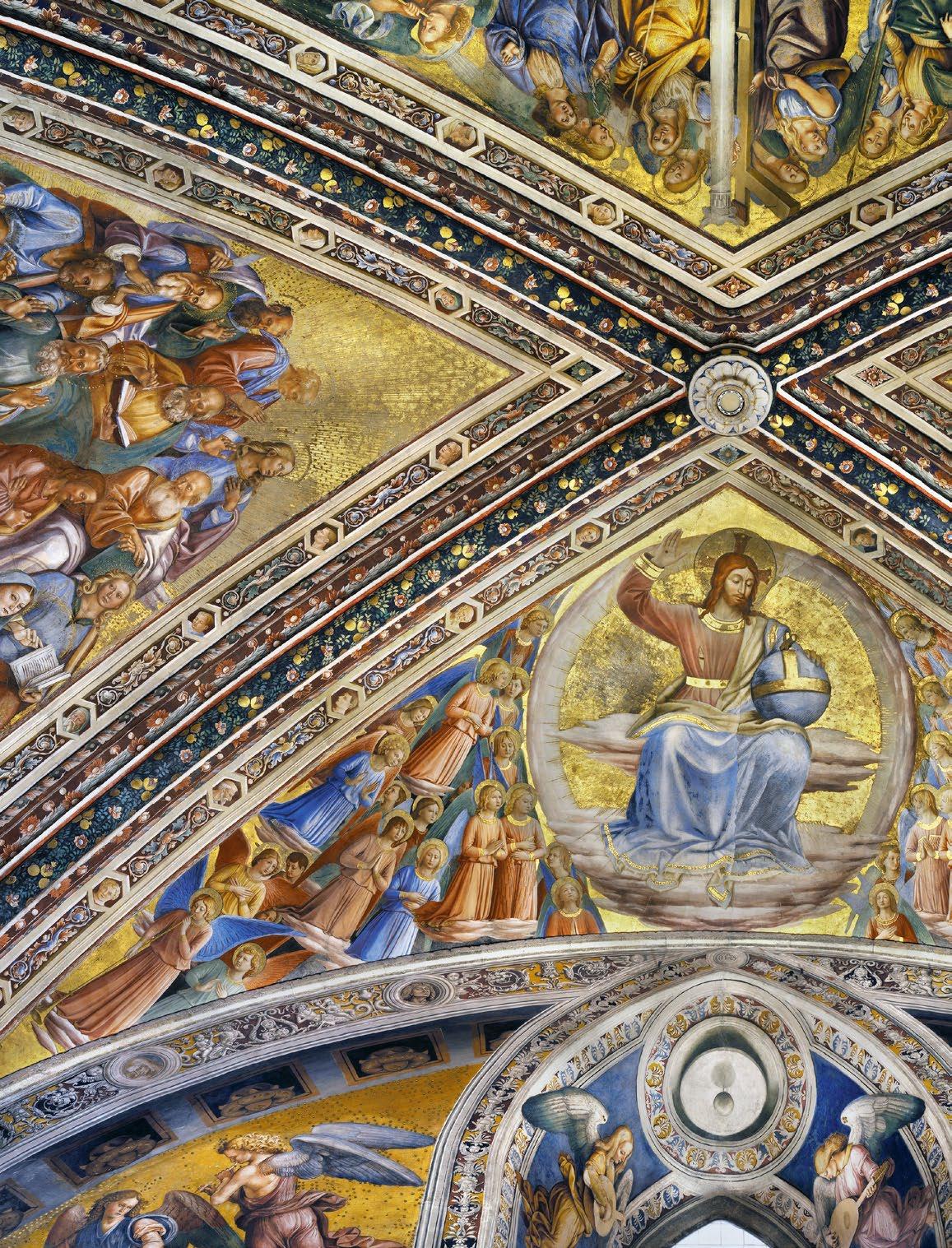
Talking about the final judgment may seem to be contrary to the love of God that is manifested in the ministry, death, and resurrection of Jesus Christ. We don't want to be like the fire, hell, and brimstone preachers of the past who, in the eyes of many or at least in some instances, were very angry. On the other hand, preaching salvation in Jesus doesn't make any sense if there's not a final judgment. When we say Jesus saves, what does he save us from if he doesn't save us from judgment, from the wrath of God on the last day? The gospel contains a promise of deliverance where there is no threat unless a day of judgment is coming. In the same way, Jesus’s death on behalf of sinners, where he took upon himself the punishment we deserve (Rom 3:21–26; 2 Cor 5:21; Gal 3:13), is pointless if there is no punishment. To reword Galatians 2:21, if Jesus didn’t die to atone for our sins, then he died for nothing.
I suspect one reason fewer unbelievers take the gospel seriously is their confidence that everything will be fine after they die. More and more people in the United States are convinced that if there is a God, then he is only loving and he will not punish anyone on judgment day. When we attend funerals of those who
never confessed Christ as Lord and Savior, we find that virtually everyone is convinced—or trying to convince themselves—that those who are deceased are just fine, that they are full of happiness and joy after their death, that life after death continues the good times enjoyed on earth. Thus, when we proclaim that Jesus saves, it doesn't resonate with many of our hearers.
What's the solution to the problem we face? One option is to talk only about God's love and to avoid references to the judgment. Some preachers take this very route, and they avoid all “negative” preaching. The problem with this, of course, is biblical faithfulness. The Scriptures emphasize the final judgment repeatedly. A few references make this clear. In John 3:36, Jesus declares, “The one who believes in the Son has eternal life, but the one who rejects the Son will not see life; instead, the wrath of God remains on him.” Or consider the warning in Matthew 10:28: “Don’t fear those who kill the body but are not able to kill the soul; rather, fear him who is able to destroy both soul and body in hell.” The apostle Paul preached the same message: “Therefore, having overlooked the times of ignorance, God now commands all people everywhere to repent, because he has set a day when he is going
to judge the world in righteousness by the man he has appointed. He has provided proof of this to everyone by raising him from the dead” (Acts 17:30–31). The warning in Revelation reminds us of how serious this matter is: “If anyone worships the beast and its image and receives a mark on his forehead or on his hand, he will also drink the wine of God’s wrath, which is poured full strength into the cup of his anger. He will be tormented with fire and sulfur in the sight of the holy angels and in the sight of the Lamb, and the smoke of their torment will go up forever and ever. There is no rest day or night for those who worship the beast and its image, or anyone who receives the mark of its name” (Rev 14:9–11). The final judgment, then, is not the invention of angry preachers. When we preach the judgment, we preach faithfully the message God himself has given to us. Jesus came to save us from the wrath to come (1 Thess 1:10; 5:9).
What can we say and what should we say about the final judgment in our own day? I am not proposing anything new here. We can begin by reiterating that life doesn't make any sense if there isn't a final judgment. Think of the novel The Lord of the Flies—there were no standards and no authorities so that anarchy, hatred, and evil plagued the island where the children lived. If there's no judgment, then Vladimir Putin will never be called to account for the horrific atrocities he has perpetrated on the Ukrainians and on so many others during his lifetime. Putin is infamous for poisoning and killing his opponents, and many of his critics “accidentally” fall out of windows to their death. If there's no judgment, then rapists, murderers, abusers, and all those who have practiced evil will never face the consequences for what they have done. If that is what the end of life is like, then life on earth doesn't really matter. Our decisions are inconsequential, life is really sound, and fury signifies nothing. The judgment, of course, isn't limited to those who murder and rape and are terrorists because all of us “have sinned and fall short of the glory of God” (Rom 3:23). The gospel shocks us because it confronts with our own evil: Putin isn’t the only one who deserves to be judged. You and I will be judged for our own sin as well.
Actually, God’s judgment shows us that he is good and holy and just. In that sense, judgment is good news. What kind of God would we be worshiping if there were no evaluation of or consequences for what we
have done, if people sin and mistreat others horribly and there is no accountability? It should be clear, then, that God's holiness and justice are not bad news but good news. They are not signs of his perversity but attest to his goodness, truth, and beauty. The final judgment assures us that evil will not finally win, that goodness will prevail, that all will be well in the end. And we will rejoice in our God because we will see clearly that “the judge of all the earth” does what is right (Gen 18:25). Heaven and earth will rejoice when Babylon is judged on the last day (Rev 19:1–5), not because there is a vengeful desire to see people punished but because goodness triumphs. The joy will be comparable to the joy that erupted when Nazism fell or when the former Soviet Union’s empire collapsed.
The final judgment also reminds us to be faithful in sharing the gospel with the lost. We show our love for others by warning them of the judgment to come. We reflect God’s heart when we urge people to repent and believe. The Lord declares, “‘Why should you die, house of Israel? For I take no pleasure in anyone’s death.’ This is the declaration of the Lord GOD. ‘So repent and live!’” (Ezek 18:31–32). If we know about a terrible impending calamity, then we owe it to others to inform them about what is coming. No disaster on earth can compare with eternal punishment; thus, we are loving to tell others about it. Of course, this isn’t our only message or even our primary message. We focus on the amazing love of God that saves sinners, but whenever we proclaim the love of Jesus in saving us, the idea that he saves us from judgment is included. Yes, we will rejoice over God’s goodness at the final judgment, but during this life we plead with love and tears for unbelievers to repent and be saved. We remind them that Jesus didn’t come to condemn the world but to save the world (John 3:17). The same Savior who atoned for our sins offers rest to all who come to him (Matt 11:28–30).
Actually, the threat of judgment also plays a role in the lives of believers. We are reminded that perseverance in faith is necessary. For instance, in 2 Thessalonians 1:5–10, Paul emphasizes God’s just judgment of unbelievers, that judgment is the destiny of those who disobey the gospel and who don’t know God. We need to remember that these words about the final judgment were not addressed to unbelievers. Those who didn’t have faith in Christ weren’t reading the letter. Paul
writes about the fate of unbelievers to Christians in Thessalonica, and the latter were suffering at the hands of the unbelievers. Why does Paul write about the judgment of unbelievers to suffering believers? Not because he wanted them to rejoice over the punishment unbelievers would face on the final day. We need to remember the context in which these stern words were written. Suffering believers were tempted under the severity of their trials to abandon the faith, to forsake Christ and to cast their lot with those in the world. Paul reminds the believers that turning away from Christ in exchange for comfort in this life would lead to eternal punishment on the last day. We learn from this that the final judgment of unbelievers also functions in the lives of believers. The prospect of future judgment is one motive—not the only motive or even the chief motive!—for perseverance in the faith.
To sum up, life on earth doesn’t make sense without the final judgment. Indeed, the gospel we preach is absurd without judgment since Jesus died for nothing if his death doesn’t spare us from the wrath to come. That wrath should also move us to bear witness to the good news of Jesus’s saving work as well as remind us to persevere in faith until the end, knowing that those who continue to believe will experience the end-time reward.


When a pastor strides to the pulpit, he must do so with a humble confidence not in himself, but in the sufficiency of Scripture and the certainty of his training. Eternity hangs in the balance. The MDiv at The Southern Baptist Theological Seminary is designed with this consequential assignment in mind.
The faculty at Southern Seminary will equip you with the humble confidence expositors need for a lifetime of faithfulness.
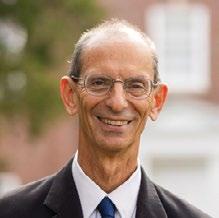
"The final judgment assures us that evil will not finally win, that goodness will prevail, that all will be well in the end."
T HOMAS S CHREINER
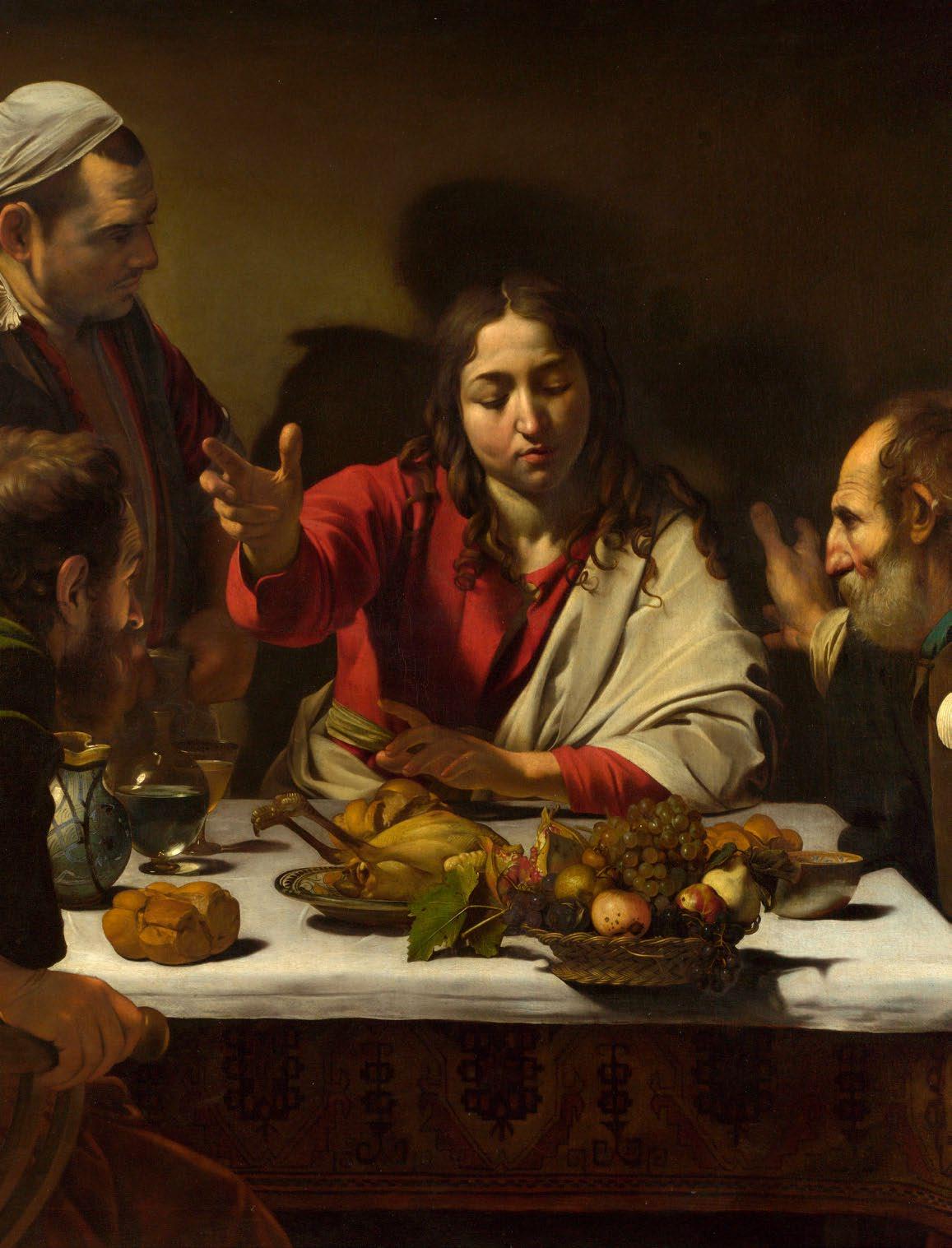
Why do we need to recover the centrality of Christ? This might seem like a strange question to ask, especially in the context of the evangelical church. Certainly, for those outside the church it’s not a surprising question to ask, but isn’t the answer obvious for those within the church? One would think so, but unfortunately if the recent polls regarding the state of theology within the church are true, it’s not a strange question to ask. Let me explain why.
In the most recent “State of Theology” poll conducted by Ligonier Ministries, numerous significant Christological questions were asked of the American public, including self-identified evangelicals. The answers given, especially those by evangelicals, revealed a serious departure from—even a denial of—a basic biblical understanding of who Jesus is as the exclusive and all-sufficient Lord and Savior. For example, when evangelicals were asked whether they believed that “there is one true God in three persons:
God the Father, God the Son, and God the Holy Spirit,” 97% responded positively. This may seem like a high number until we remember that one cannot be a Christian without believing that God is triune. Even a 3% departure from this truth is already a denial of the God of Scripture!
However, if this is not serious enough, it gets even worse when questions are asked regarding who Jesus is. For example, when these same evangelicals were asked about who Jesus is, a whopping 58% affirmed that he was “the first and greatest being created by God,” and 27% affirmed that Jesus was only “a great teacher, but he was not God.” The first belief is the heresy of Arianism that was rejected by the Council of Nicaea in AD 325—a heresy that today is taught by Jehovah’s Witnesses. The second belief explicitly denies the deity of Christ, a truth that 97% of these same people supposedly affirmed in their avowal of the Trinity! Given such theological confusion, it’s not surprising that when these same people were asked whether
“God accepts the worship of all religions, including Christianity, Judaism, and Islam,” 39% agreed.1
How should we interpret these conflicting and disturbing responses? Minimally, this poll reveals a serious lack of biblical-theological knowledge and fidelity, and worse, it exposes the sad fact that many who identify as evangelicals know little about historic Christianity. We can’t assume that those in our churches know basic Christian theology. Also, central to these responses is a confused understanding of the exclusivity, uniqueness, and sufficiency of Christ.
But it’s not simply this poll that reveals these facts. Further evidence of the loss of Christ’s centrality in our lives and churches is observing what grabs our attention on social media. Unfortunately, what captures our time is not sound theological reasoning regarding Christ but various “causes” that are at best secondary implications of the gospel. Instead of many being consumed with knowing our Lord Jesus Christ in truth and seeking to live under his sovereign Lordship, we are more concerned with our own personal peace, fame, and fortune. These facts alone should be incentive for us to recover the centrality of Christ for God’s glory, our good, and the life and health of the church. But let me offer three additional reasons.
1. Recovering Christ’s Centrality Because of His Glorious Person and Work
Who is Jesus? Scripture is clear: Jesus is no mere human, teacher, or religious leader whom we can take or leave; instead, he is God the Son incarnate, the eternal “Word made flesh” (John 1:1, 14 ESV paraphrase).
First, Jesus is God the Son, the second person of the triune Godhead, who has eternally shared the one divine nature with the Father and Spirit (John 1:1–2) and who is thus truly God. In Scripture, the evidence for the Son’s deity is abundant. Jesus is identified as LORD by inaugurating God’s kingdom—thus doing the work of God (Isa 9:6–7; Jer 31:31–34; Ezek 34:1–31). With the Father and Spirit, the Son fully
and equally shares the one divine name and thus one divine nature (Matt 28:18–20; John 8:58; Phil 2:9–11; Col 2:9). Jesus is identified as God (theos; John 1:1, 18; 20:28; Rom 9:5; Titus 2:13; Heb 1:8; 2 Pet 1:1) because he is the exact image and correspondence of the Father (Col 1:15; Heb 1:3). The Son shares with the Father and Spirit the divine rule and works, and he receives divine worship (Ps 110:1; Eph 1:22; Phil 2:9–11; Col 1:15–20; Heb 1:1–3; Rev 5:11–12). This is why Jesus has the authority to forgive sin (Mark 2:3–12), to claim that all Scripture is fulfilled in him (Matt 5:17–19), and to acknowledge that he is from the Father as the Son but also that he is equal to the Father (Matt 11:25–27; John 5:16–30; 10:14–30; 14:9–13).
Second, Jesus is the eternal Son incarnate. By an act of assumption, and by the means of the virgin conception, the Son—from the Father and by the supernatural and sanctifying agency of the Spirit—took to himself an unfallen and sinless human nature consisting of a body and soul (Matt 1:18–25; Luke 1:26–38; Phil 2:6–8). As a result, the Son added a human dimension to his personal divine life, yet without setting aside or compromising his deity, and he now and forever acts in both natures as our Lord and Savior. It’s as the incarnate Son that he is able to render human obedience (Luke 2:52; 22:29–44; Heb 5:8–10) for us as the last Adam (Rom 5:12–21; Heb 2:5–18) as well as to do a divine work by securing our eternal redemption (Eph 1:7–10) and justifying us before God as covenant representative and substitute (Rom 3:21–26; 4:25; 1 Pet 3:18).
1 See the 2022 results of “The State of Theology Poll” at https:// thestateoftheology.com. Note: percentages pulled at the time of writing and do adjust as the survey is updated.
Third, what did Jesus do for us? Our Lord’s work is so rich that it’s difficult to capture in a few words. Yet, we must never forget that what Jesus did is because of who he is. Ultimately, our Lord accomplishes a divine-human work, which is precisely what we need for our salvation. Jesus fulfills God’s eternal plan of salvation by becoming our mediator and new covenant head. In this office, he is the great prophet, priest, and king, thus fulfilling and transcending Old Testament figures. More specifically, Jesus redeems, reconciles, and justifies us by his obedient life, sacrificial death, and triumphant resurrection by reversing the effects of sin and death as well as inaugurating a new creation, which he will consummate at his return (1 Cor 15:12–49; 2 Cor 5:17; Rev 21–22).
Fourth, central to Christ’s priestly work is his death for our sins (Matt 1:21; 1 Cor 15:1–3). Although the achievement of Christ’s cross is manifold, central to it—and why Jesus had to die—is the purpose to satisfy God’s righteous and holy demand against us due to our sin. Penal substitution best captures this central truth. Penal refers to the sorry state that we are in due to Adam and our standing under God’s judgment and the penalty of death (Eph 2:1–3). Substitution refers to who Jesus is and what he does for us—namely, as God the Son incarnate, he is our substitute by taking his own righteous demand on himself, thus satisfying divine justice (Rom 3:21–26). Because of our faith union with Christ, God declares us justified and thus reconciled, redeemed, and freed from the bondage of sin, death, and Satan. All of our hope now and forever is in Christ alone.
In light of these biblical truths, no wonder Scripture teaches that Christ is Lord over all, thus demanding that he must be central in our lives and churches. For in Christ alone is life eternal (John 17:3); in him all of God’s purposes and promises find their fulfillment (Heb 1:1–3) as “all things in heaven and on earth” are brought under his sovereign Lordship (Eph 1:9–10). Given Christ’s person and work, there is no other option than to recover the centrality of Christ, for he alone is worthy of all our worship, adoration, and joyful, willing, and glad obedience.
Given the present “state of theology” in our churches, it’s safe to say that our biblical-theological grasp of basic theology is weak. This situation is not something to be proud of; instead, it should lead us to repentance and a determination to know again the truth of Scripture in all of its depth and breadth. False teaching is not an innocent matter; ultimately, life and death depend on our believing all that Scripture teaches and rejecting all ideas contrary to God’s Word.
In this light, it’s crucial to remember, as Jeremy Jackson reminds us, that what is at the heart of all heresy is
some distortion or denial of Christ.2 This is why a person’s Christology—namely, what one confesses regarding the person and work of Christ—is a test case for one’s entire theology. Thus, the more we get Jesus and his work wrong, especially in terms of his exclusive identity and all-sufficient work, the easier it will be for us to embrace false teaching in other areas. “Ideas have consequences,” and the most central “idea” to get right is who Jesus is in all of his glory. There are many beliefs that distinguish Christianity from other worldviews but none as central and significant as who Jesus is and what he does for us. Error at this point is deadly for our relationship to God and destructive of our entire theology. The only solution to such a situation is to recover the centrality of Christ in our theological understanding, in our individual lives, and in the life of the church.
As Paul reminds us in Colossians, there is no higher privilege and calling for the church, both individually and corporately, than to know Christ. All things were created not only “by him” but also “for him” (Col 1:16). Our Lord Jesus is the Lord of creation and redemption, and our calling is to know and proclaim him so that we may be found “perfect in Christ” (Col 1:28). Given that “in Christ all the fullness of deity lives in bodily form” (Col 2:9), we are “to bring all of our thoughts captive to Christ” (2 Cor 10:5) by grounding all of our thinking and all of our lives in him (Col 2:8). Every idea we are confronted with must be tested by the standard of God’s Word, which centers on the glory of our Lord Jesus Christ. Unless we do, inevitably we will be drawn toward serious errors and away from salvation and life. But as we grow in our knowledge of Christ, along with our trust, obedience, and love for him, we will be kept from error and will experience salvation and life.
How do we recover the centrality of Christ today? First, we need to recover the faithful exposition of Scripture. We only know the glory of who our Lord and Savior is and what he has done for us from the entire canon
2 Jeremy C. Jackson, No Other Foundation: The Church through Twenty Centuries (Westchester, IL: Crossway, 1980), 31–42.
of Scripture. Faithful biblical exposition will lead us to Christ, and this is what the church desperately needs today. The central calling of the church is to know and proclaim the triune God in the face of our Lord Jesus Christ—“We proclaim him!” (Col 1:28). The church wanders dangerously from her calling if she veers from this central task. We must not let tangential issues replace the centrality of knowing Christ and living “by faith in the Son of God, who loved me [us] and gave himself for me [us]” (Gal 2:20).
Second, we need to return to reading sound theology from the past and learning from our forefathers in the faith concerning how to think rightly about Christ and his work. A social media age yields many positive things, but what it undermines is the hard work of careful reading and deep theological reflection on Christ from historical theology. But thinking through all that Scripture says about Jesus and wrestling with the church as she has sought to faithfully confess Christ is not an easy task. Yet it’s absolutely necessary to do, especially if we are going to think rightly about God, the gospel, and the entire Christian faith. Given the present “state of theology” in the church, there is no more glorious calling—but also challenging task— than to think rightly about Christ from Scripture and church tradition. But we must never forget that the study of Christ is not reserved for academic theologians—it’s the privilege and responsibility of every Christian! The Christian life and the Christian ministry are about knowing God in truth and being vigilant for the truth of the gospel by knowing and proclaiming Christ.
Third, we need to obey all that our Lord Jesus commands, which includes all of Scripture, and live in joyful submission to Christ. In our day, this is a growing challenge. It’s one thing to confess Christ rightly; it’s another thing to obey all that he has commanded, especially where such commands stand against the mindset and pressures of our age. But the question before us is this: Will we obey all that Jesus has taught, even in the areas that stand against our culture, or will we not? Will we love him more than we love our own perceived reputations and be willing to stand as “radicals” for Christ? Or, will we attempt to “construct” a Jesus in our image who is merely “winsome” and “gentle,” instead of submitting ourselves
to the Jesus of the Bible in all of his holiness, glory, and sovereignty?
Although the centrality of Christ is taught everywhere in Scripture, it’s gloriously presented in one of Scripture’s culminating visions. In Revelation 4–5, John records his breathtaking vision of God in all of his glory, holiness, authority, sovereignty, and selfsufficiency. What is also significant about this vision is that it reminds us about who is truly central, not only in our individual lives but also in the church and indeed in the entire universe—namely, the Lord and the Lamb.
In every generation, Christians need this culminating vision of Scripture to renew them. We need to be constantly reminded about who is central, who is worthy, who is to be obeyed, and who is our only hope and salvation. Indeed, we need to learn afresh to confess with the angelic hosts, “To him who sits on the throne and to the Lamb be blessing and honor and glory and might forever and ever!” (Rev 5:13). It’s only as we are reminded about the centrality of Christ that the life and health of the church will be renewed, not merely for our own good but also for the glory of our triune God in the face of our Lord Jesus Christ. May it be so in our lives.

"There are many beliefs that distinguish Christianity from other worldviews but none as central and significant as who Jesus is and what he does for us."
S TEPHEN W ELLUM
BY TRAVIS HEARNE
The first public Sunday of The Oaks Church was April 17, 2017, but the story began long before.
Terry-Lee Kirkland moved his family to Louisville, KY, in 2012 so he could pursue his M.Div. from The Southern Baptist Theological Seminary. Their church family at Highview Baptist Church affirmed that God was leading them to plant. So, during that time, Kirkland began researching “SEND” cities—32 Cities NAMB has selected as strategic cities for church planting.
When they moved to Cincinnati in 2016, only 14% of the population identified with an evangelical church.
As they prepared for the difficulties ahead and the official launch in 2017, Kirkland prayed that God would provide another staff member to partner with.
He knew exactly where to look.
“Jimmy and I had known one another from seminary and serving on staff together at Highview,” Kirkland said.
Sitting in the same classrooms as Kirkland at Southern Seminary, Jimmy Funchess, now Executive Pastor at The Oaks Church and a three-time graduate of Southern Seminary, was an obvious choice.
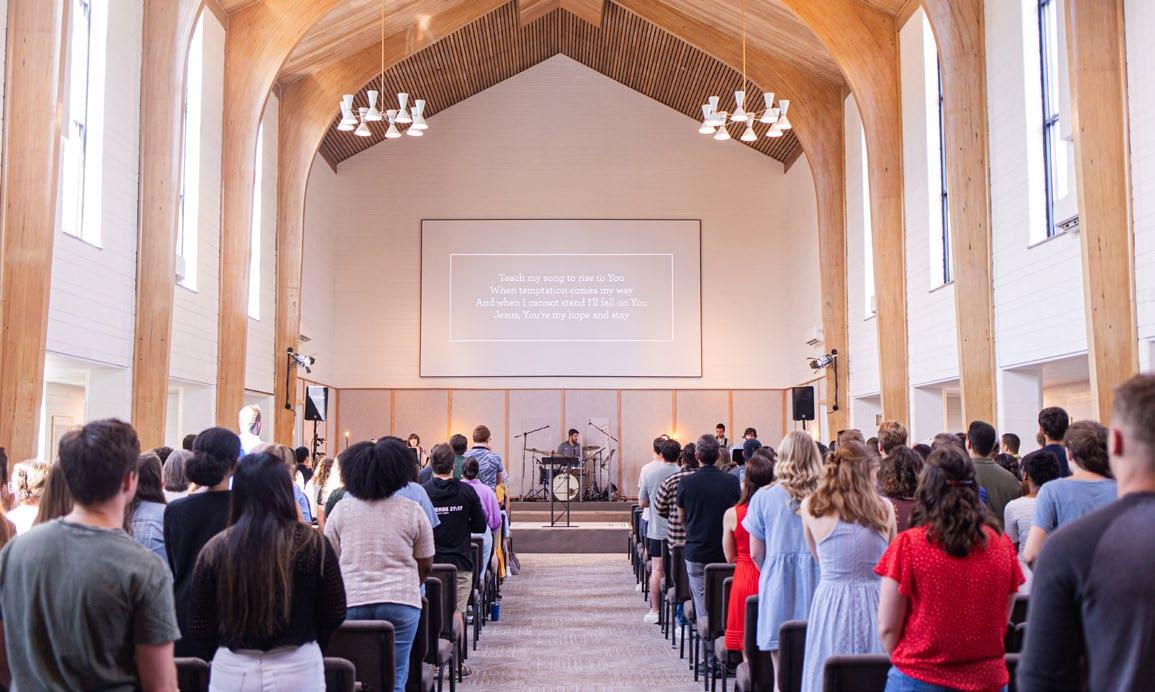
Kirkland knew Funchess valued the same convictions for church planting. They would each take leadership, membership, and discipleship seriously from the beginning.
“My wife and I invited Jimmy and his wife, Katelyn, to Cincinnati for lunch,” Kirkland said. “Sitting at the Incline Public House overlooking the city, I asked if they would be willing to pray about making Cincinnati their home and The Oaks their place in God’s mission. They agreed. In May of 2017, the Funchess family moved to Cincinnati.”
However, Funchess and Kirkland knew there was more than just a need for additional churches. The city (and world) needs biblical churches committed to truth.
“The need for gospel-preaching churches was clear, and the missional opportunities in Cincinnati were abundant,” Funchess said. “Like most cities all around our country and the world, Cincinnati needed pastors and church planters who were serious about the gospel and serious about the mission of God.”
The Oaks has grown from community gatherings of 30 people to a healthy church with over 350 members—a bright spot in a city that is secularizing at an increasing pace. But Funchess and Kirkland never considered measuring the church’s success by its reach or influence. Instead, theological faithfulness and total submission to the authority of Scripture and the Great Commission were the ultimate standards. Pleasing God, not man.
FUNCHESS AND KIRKLAND BOTH CREDIT THEIR TIME AT SOUTHERN SEMINARY FOR INSTILLING A COMMITMENT TO EVANGELISM AND THEOLOGICAL FAITHFULNESS.
“At Southern Seminary, you don’t just gain information,” Kirkland said. “”What seemed theoretical at the time became very real in the early days of The Oaks. I remember asking Greg Allison questions in his ecclesiology class that have been fleshed out in our church planting journey. I use the principles of hermeneutics and homiletics every
week when I study a text. The careful teaching of Dr. Plummer, Dr. Pohlman, and Dr. York is reflected throughout my sermons. I also seek to emulate Dr. Pierre’s care for his classmates in counseling our church members. The theological training at Southern is unmatched and has proved practical every step in this journey.”
Funchess had a similar experience.
“When I arrived in Louisville, Kentucky, in 2013, I was a tremendously different person than when I left to plant in Cincinnati in 2017,” Funchess said. “The lectures and classes shaped me and helped me to think in a biblical framework. However, I also developed relationships with professors who were very eager to invest in me. I remember walking with Dr. Schreiner to his office and meeting to discuss theological questions. I remember meeting with my shepherding group professor’s house to share in community together with other students. I remember Dr. York inviting me to chat in his office at Buck Run to discuss the potential of doctoral studies. The professors are eager to shape their students and help them to follow the Lord’s call on their lives.”
One of the most encouraging things for Kirkland as a church planter is seeing their church as a place to raise up the next generation of church leaders and planters.

“ONE OF THE MOST REWARDING ASPECTS OF MINISTRY HAS BEEN THE DEVELOPMENT OF SONS AND DAUGHTERS IN THE FAITH,” KIRKLAND SAID. “WE HAVE HAD SEVEN OF OUR CHURCH MEMBERS RESPOND TO THE CALL OF FULLTIME MINISTRY AND BECOME STUDENTS AT SBTS OVER THE PAST EIGHT YEARS.”
Kirkland also loves how the Great Commission is not viewed as a task just for church leaders at The Oaks. One of his favorite examples of the Spirit’s work in the lives of their people comes from an interaction between a church member, Aubrey, and a restaurant manager she met named Chris.
“What are you living for?”
Chris had never been asked that question. He sat in his house for over an hour, agonizing over that blank sheet of paper. He wondered how he couldn’t write down an answer to that seemingly fundamental question.
He returned the next day and asked Aubrey, “Well, what do you live for?”
Aubry knew how to answer because this question from Chris was the question she hoped her own question the day before would initiate. It was a question her church had also equipped her to answer.
“I live for the Lord,” Aubry said. “We were created for a relationship with God.”
Stemming from this interaction, Chris professed faith in Christ, underwent baptism, and now teaches elementary-age classes at The Oaks Church on Sundays.
Kirkland says these are the stories he lives for as a church planter. Cincinnati is a city where people need to be confronted with the gospel, Christians need to be equipped to share it, and churches need to exist to proclaim it.
Southern Seminary exists to equip the equippers.
Boyce College exists for the Deployment of the
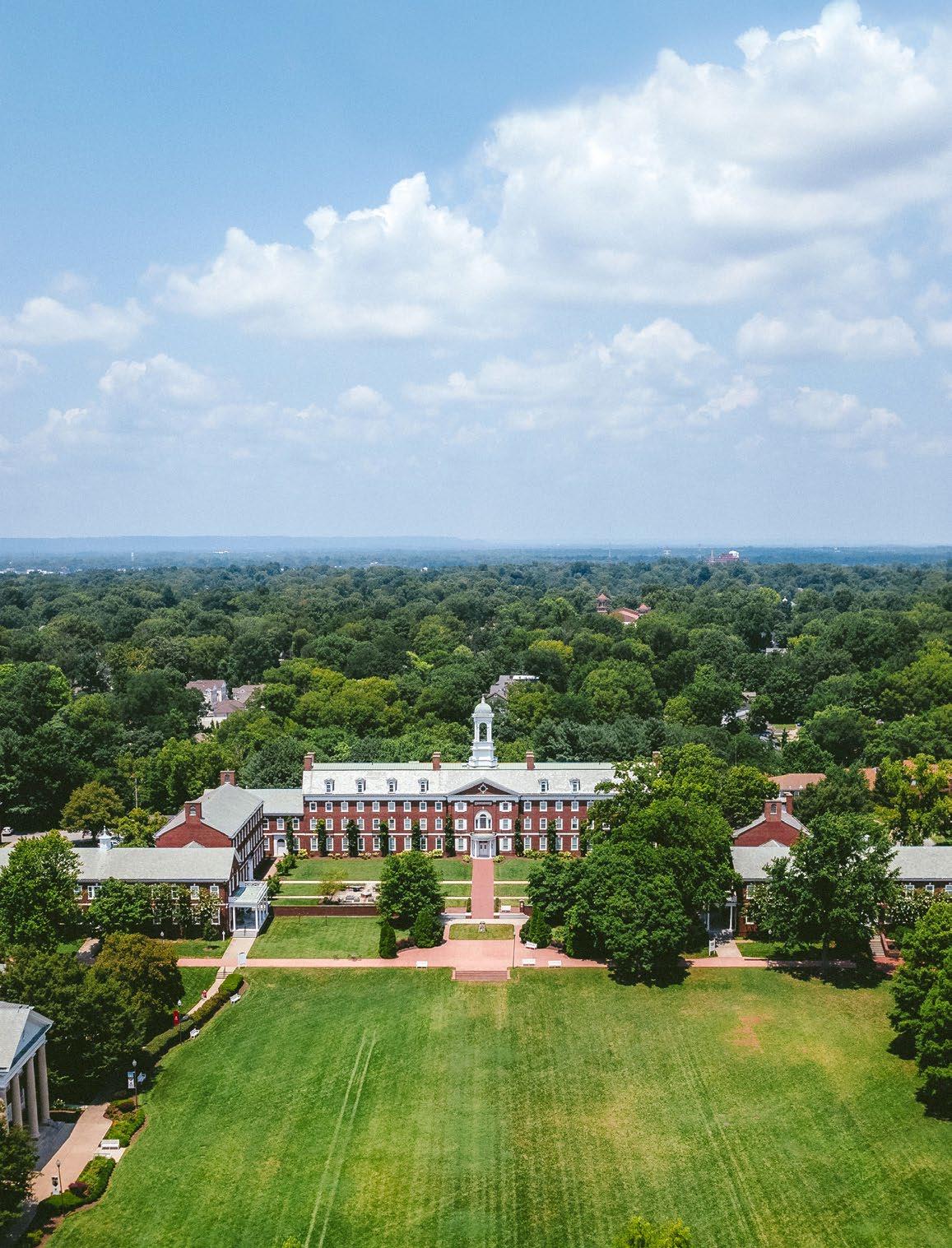
At Boyce College, students are grounded in a Christian worldview with a curriculum designed to deepen their Christian faith and strengthen their understanding of God's Word. Combined with a vibrant culture of discipleship, we prepare students to excel wherever the Lord leads.
Take the first step towards fulfilling God’s call for maximum faithfulness at BOYCECOLLEGE.COM

Have you ever thought about these three things together: salvation, the Holy Spirit, and God’s presence? We often consider salvation to be the forgiveness of our sins, the new birth, being declared “not guilty but righteous instead,” rescue from hell, and receiving the gospel through repentance and faith in Christ—all of which are true! Regarding the Holy Spirit, we may believe that he’s the “forgotten God,” a divine power within us, something for Pentecostals and charismatics but not us Baptists, or an ethereal being somewhat like Casper the Ghost—all of which are not true!1 As for God’s presence, we usually think of a future blessing that we Christians will experience after we die and our soul goes to be with the Lord in heaven—which is partly true and partly not true!
How would you react, then, if I were to tell you that the greatest gift that God gives to us in our salvation is the Holy Spirit so that, as he fills us, we can experience the greatest blessing of salvation, which is the presence of God the Father, God the Son, and God the Holy Spirit?
Let me show you what I mean by each of these three key themes.
Look at the following two versions of Jesus’s teaching about the goodness of God the Father. In both accounts, Jesus is drawing a comparison between human (yet sinful) parents and our heavenly Father. The first is from the Gospel of Matthew: “If you then, who are evil, know how to give good gifts to your children, how much more will your Father in heaven give good things to those who ask him” (Matt 7:11 ESV, italics added). The second is from the Gospel of Luke, which features a slight yet important difference: “If you then, who are evil, know how to give good gifts to your children, how much more will the heavenly Father give the Holy Spirit to those who ask him?” (Luke 11:13, italics added). Like earthly parents, who give good gifts to their children, God the Father gives good gifts to us his children. Luke focuses on one of those gifts: like earthly parents, who give good gifts to their children, our heavenly Father gives the Holy Spirit to us his children.
give good gifts
1 Francis Chan, Forgotten God: Reversing Our Tragic Neglect of the Holy Spirit (Colorado Springs: David C. Cook, 2009).
give the Holy Spirit
Here’s my thesis: the greatest gift that God the Father gives to those who embrace salvation through his Son is the Holy Spirit.
I can already hear your objection: “NO! NO! NO! The greatest gift that God gives is salvation itself!” And I totally agree with you! But notice what I propose: the greatest gift that the Father gives to those who have already received the great gift of salvation in the Son is the Holy Spirit.
The greatest gift of God in salvation is the Holy Spirit.
Certainly, this gift includes the mighty acts of the Spirit in saving us, including conviction of sin (John 16:8–11), regeneration or the new birth (John 3:1–8; Titus 3:4–7), adoption into God’s family (Gal 4:4–7), assurance of salvation (Rom 8:14–16), sanctification (2 Thess 2:13; 1 Pet 1:2), and our future resurrection (Rom 8:11). But more importantly, and standing behind his saving works in our life, is the Holy Spirit himself—the “Father’s promise” (Luke 24:49; Acts 1:4; 2:33) and “the gift” (Acts 2:38; 10:45; 11:17).
What does God expect us to do with this gift? How are we to use this gift? Listen to the apostle Paul’s directive:
Don’t get drunk with wine, which leads to reckless living, but be filled by the Spirit: speaking to one another in psalms, hymns, and spiritual songs, singing and making music with your heart to the Lord, giving thanks always for everything to God the Father in the name of our Lord Jesus Christ, submitting to one another in the fear of Christ. (Eph 5:18–21)
Notice four key points for understanding Paul’s instruction:2
• Its mood is imperative. It’s not a promise. It’s not a suggestion. Rather, it’s a command to be obeyed: “be filled with the Spirit.”
• Its tense is present. It’s an ongoing command: “keep on being filled with the Spirit” (paraphrase).
• Its voice is passive. It’s not an active voice imperative (e.g., “transform this outdated room”), so it does not call for some action on our part. Rather, it’s a passive voice imperative (e.g., “let this outdated room be transformed”), so it calls for receptivity, for a certain posture or disposition.
• The expected or intended response to this command is for us to yield to the Holy Spirit, to be controlled—pervaded or permeated—by the Spirit in all our ways, to consciously place ourselves under the guidance of the Spirit moment by moment. Such yieldedness to the Holy Spirit will be evidenced as together we experience genuine community (“speaking to one another in psalms, hymns, and spiritual songs”), engage in sincere worship (“singing and making music with your heart to the Lord”), express gratitude in every circumstance (“giving thanks always for everything”), and love and honor one another through mutual submission (“submitting to one another in the fear of Christ”).
In addition to Ephesians 5:18, which uses the language of “being filled with the Spirit,” Paul employs similar expressions in his other letters to exhort us toward this ongoing posture of yieldedness to the Spirit. When we “walk by the Spirit” (Gal 5:16), we are prompted to do the will of God rather than fulfill the desires of our sinful nature, and we bear “the fruit of the Spirit”: “love, joy, peace, patience, kindness, goodness, faithfulness, gentleness, and self-control” (Gal 5:22–23). Paul adds, “If we live by the Spirit, let us also keep in step with the Spirit” (Gal 5:25). He uses similar language in Romans 8:4–6, encouraging us to walk not according to the flesh but according to the Spirit.
We appropriate and enjoy the gift of the Holy Spirit by being filled with the Spirit, walking by or according to the Spirit, living by the Spirit, and keeping in step with the Spirit. Our posture is one of yieldedness—or submission—to the Holy Spirit and his guidance in our life.
2 The following is adapted from Gregg R. Allison, “Baptism with and Filling of the Holy Spirit,” Southern Baptist Journal of Theology 16, no. 4 (Winter 2012): 15.
As we are filled with the Holy Spirit, he fills us with the presence of the God who is three persons. Notice that I said “fills” (present tense) to indicate that the greatest blessing of salvation is not reserved for after our death, when we go to be with the Lord in heaven. Rather, the greatest blessing of salvation is the triune God’s presence in us and in our church that begins now as we live for him in this earthly life.
As Michael Horton explains, “Through the Spirit’s operation, all three persons come near to us and bring us into their fellowship.”4 It is specifically the Holy Spirit who brings about this personal presence of the triune God (this is the divine aspect), and we experience it through faith (this is the human aspect).
Paul emphasizes these two aspects in his prayer for the Ephesians: “I pray that he [God the Father] may grant you, according to the riches of his glory, to be strengthened with power in your inner being through his Spirit, and that Christ may dwell in your hearts through faith” (Eph 3:16–17). Through the Holy Spirit, Christ dwells in us (the divine side) through faith (the human side). Jesus himself pledges, “If anyone loves me, he will keep my word, and my Father will love him, and we will come to him and make our home with him” (John 14:23, italics added). Jesus promises that if we love and obey him (the human side), both the Father and the Son will dwell in us (the divine side). But how is this pledge fulfilled?
Immediately before this promise, Jesus assures his disciples, “I will ask the Father, and he will give you another Helper, to be with you forever, even the Spirit of truth. . . . You know him, for he dwells with you and will be in you” (John 14:16–17, italics added). Thus, the presence of both the Father and the Son in us is associated with the dwelling of the Holy Spirit in us.
As the Spirit fills us, he fills us with the presence of the triune God. Through the indwelling Holy Spirit, the triune God—Father, Son, and Spirit—is present with us. And what is true of us individually is also true of our church, to which Paul refers as “the temple of the Holy Spirit” (1 Cor 3:16–17; 2 Cor 6:16; Eph 2:21–22) and to which Peter applies the imagery of “living stones, . . . a spiritual house [that is, a house of the Spirit]” (1 Pet 2:5).
Still, while this promise of the presence of the triune God is presently fulfilled in us and in our church, the fullness of its fulfillment awaits a future event: the return of Jesus Christ and the establishment of the new heaven and new earth:
Then I saw a new heaven and a new earth, for the first heaven and the first earth had passed away, and the sea was no more. I also saw the holy city, new Jerusalem, coming down out of heaven from God, prepared as a bride adorned for her husband. And I heard a loud voice from the throne saying, “Behold, the dwelling place of God is with man. He will dwell with them, and they will be his people, and God himself will be with them as their God. He will wipe away every tear from their eyes, and death shall be no more, neither shall there be mourning, nor crying, nor pain anymore, for the former things have passed away.” (Rev 21:1–4, italics added)
Certainly, we experience salvation in part now, during our earthly life. And the greatest blessing of that salvation is the presence of the triune God through the filling of the Holy Spirit, who is the greatest gift, which we have by faith. At the same time, we long for salvation in full, in the age to come. Then, and only then, will that greatest blessing through the greatest gift—the actual presence of the triune God—be ours in full, not by faith but by sight, when we see God “face to face” (1 Cor 13:12).
3 As he discusses the work of the Holy Spirit, J. I. Packer highlights the idea of presence; see J. I. Packer, Keep in Step with the Spirit: Finding Fullness in Our Walk with God, rev. and enl. ed. (Grand Rapids: Baker, 2005).
4 Michael Horton, Rediscovering the Holy Spirit: God’s Perfecting Presence in Creation, Redemption, and Everyday Life (Grand Rapids: Zondervan, 2017), 28.

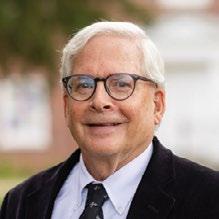
"We appropriate and enjoy the gift of the Holy Spirit by being filled with the Spirit, walking by or according to the Spirit, living by the Spirit, and keeping in step with the Spirit."
G REGG A LLISON
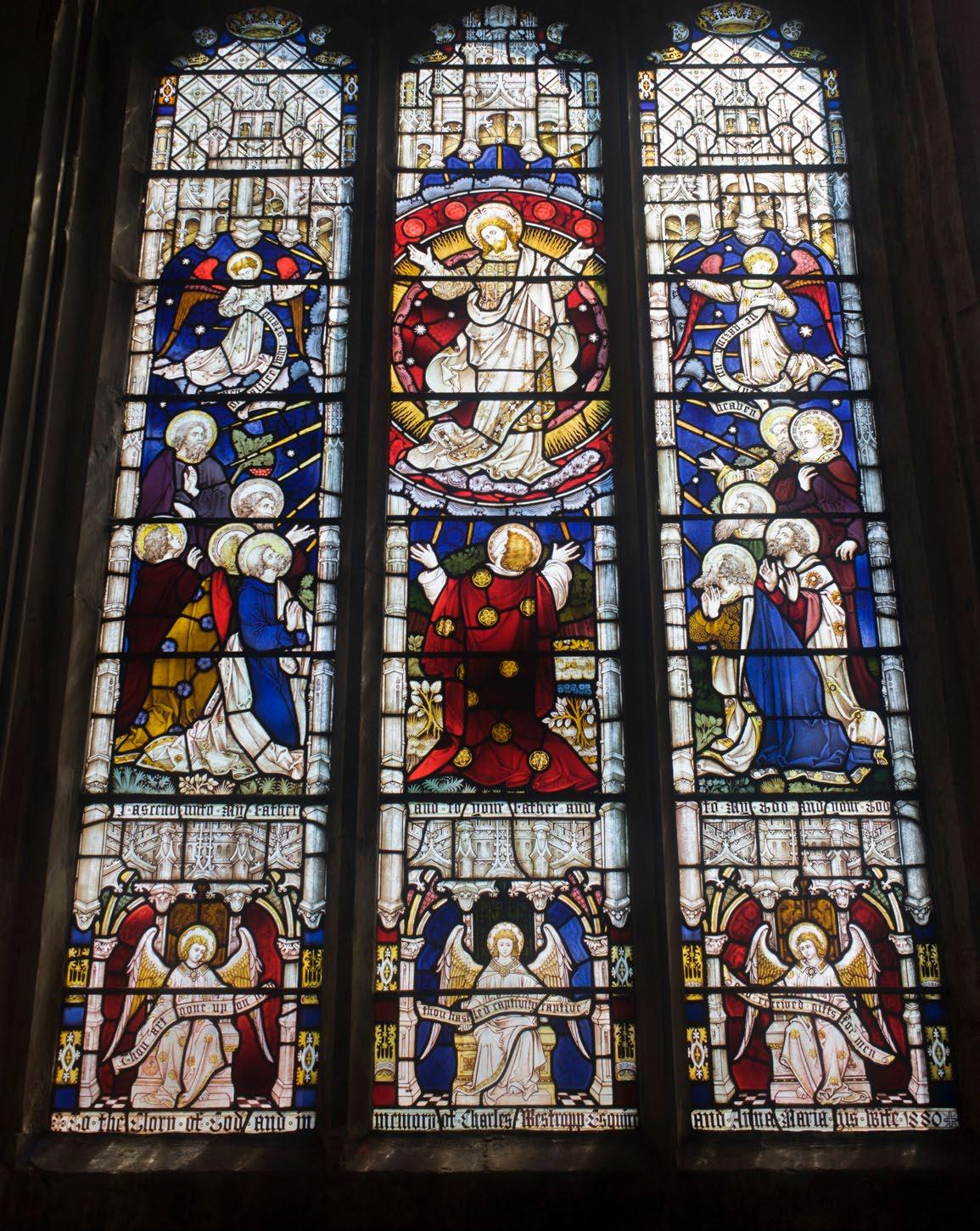
Can you explain your understanding of the doctrine of the Trinity?” A member of a deacon ordination council posed this question to a candidate for the diaconate of a local Baptist church. The candidate had a strong record of faithful attendance, served the saints tirelessly, and had gained a reputation for godliness in life. Council members asked strong questions about the authority of Scripture, justification by faith, marriage, and a whole range of ethical issues facing Christians today. The candidate answered ably and faithfully. But when someone asked about the Trinity, the silence was palpable. The candidate froze, eyes wide. He finally said, “I think that mystery is a little too deep for me.”
That sentiment is all too familiar in evangelical churches. Even when the commitment to other matters of sound doctrine is strong and clear, Christians get nervous and uncertain in their commitment to the doctrine of the Trinity as revealed in Scripture and confessed by the church for many centuries. Beyond a timid affirmation that the doctrine is true, few have the interest or ability to articulate a Trinitarian confession clearly and faithfully.
Perhaps part of the reluctance is owing to the gravity of the subject matter. We are talking about God after all—the infinite, invisible, eternal, unchangeable, and omnipotent Creator of the entire universe. Surely finite creatures cannot fully understand the infinite God! Another factor may be the complexity of the doctrine. One must think and speak carefully to affirm that there is only one true and living God who eternally exists as three persons. It is all too easy to speak or think of the Trinity in a misguided way. Learning to speak faithfully, it seems, is a laborious task.
These concerns are not entirely illegitimate, but they do not constitute a reason for Christians to shy away from the doctrine of the Trinity. Augustine of Hippo acknowledged these concerns many centuries ago. Rather than shy away from the doctrine, however, he went on to write an extensive treatise on the subject, one that continues to serve Christians more than a millennium and a half later. Near the beginning of his treatise, he implores his readers,
Dear reader, whenever you are as certain about something as I am go forward with me; whenever you stick equally fast, seek with me; whenever you notice that you have gone wrong come back to me; or that I have, call me back to you. In this way let us set out along Charity Street together, making for him of whom it is said, “Seek his face always” (Ps 105:4). . . . For nowhere else is a mistake more dangerous, or the search more laborious, or discovery more advantageous.1
In that same spirit, I invite you to follow along with me as we consider the doctrine of the Trinity and why it matters for Christians. Let us not be silent about the Trinity for fear of danger or dread of laborious complexity. Rather, let us seek the face of the triune God that we may discover the everlasting advantage of knowing him according to his revelation of himself. In the few pages that follow, I first describe the doctrine theologically in an effort to state the basic affirmations that Christians make when they confess that God is a Trinity. Then, I defend the doctrine biblically, demonstrating that the doctrine of the Trinity is not the invention of men but the articulation of truth revealed in God’s very Word. Finally, I commend the doctrine of the Trinity as basic to the Christian faith and precious to all Christians.
The doctrine of the Trinity is the unwavering Christian belief that there is only one true and living God who eternally exists as three distinct persons—the Father, the Son, and the Holy Spirit. The three persons are really distinguished by their eternal relations to one another. The persons are united as one God in the indivisible unity of one essence.
Several things are worth noting about this description. First, it affirms that God is one and that God is three. Some people misunderstand the doctrine at precisely this point and so misrepresent it. Accusations of
1Augustine of Hippo, The Trinity (De Trinitate), trans. Edmund Hill, ed. John E. Rotelle, vol. 5 of The Works of Saint Augustine: A Translation for the 21st Century, pt. 1, Books, 2nd ed. (Brooklyn: New City Press, 2015), 1.1.5 (p. 67; emphasis added).
logical nonsense are often leveled against Christians who supposedly think that 1 + 1 + 1 = 3, a logical absurdity. But this kind of mathematical folly in no way represents what Christians believe. Instead, we recognize that the Bible speaks with equal clarity about God in two different ways: (1) there is only one true and living God, and (2) there are three distinct figures, each of whom is the one God. In order to speak consistently about God while affirming all that the Bible says about him, Christians have developed a set of conceptual terms to articulate the truth claims of the Bible itself. One such term is “essence” (or being), which Christians have used historically to speak about the oneness of God. To say that there is one divine essence is exactly the same thing as saying that there is one God. Another conceptual term that has developed over time is “person.” To speak of the divine persons is to speak of the real eternal relations between the Father, the Son, and the Holy Spirit. So, God is one, and God is three. But he is not one and three in the same way, as the absurd math problem suggests. Rather, he is one in essence and three in persons.
Second, notice that the distinction between the persons is a distinction constituted by their relations to one another and by nothing else. Each person— Father, Son, and Holy Spirit—just is the one God. They are not different beings (essences) who happen to be of the same kind. Rather, there is only one being (essence), one God. Each of the three is the one God in a truly distinct way. The names of the persons tell us what we need to know about how they are distinct from one another. The names “Father” and “Son” name the first two persons in relation to each other. The Father is Father of the Son. The Son is Son of the Father. The word “spirit” in Scripture can be translated as “breath,” and so the name “Holy Spirit” names the third person of the Trinity in relation to the other two. He is the breath of the Father and the Son. The relations are between the persons eternally, such that, in the words of the Athanasian Creed, “neither is before or after another.” The Son is begotten of the Father eternally, but he is not a creature. The Holy Spirit proceeds eternally as breath from the Father and the Son, but he also is not a creature.
In other words, the relations between the divine persons of the Trinity are constitutive of the very being of God. Apart from these eternal relations between Father, Son, and Holy Spirit, there would be no God.
Because many of the terms used to articulate this doctrine are not explicitly found in the Bible (e.g., Trinity, essence, person), it would be easy to conclude that the doctrine of the Trinity is the product of man-made philosophy rather than the revealed truth of Holy Scripture. Nothing could be further from the truth!
The doctrine of the Trinity is called a distributed doctrine, meaning that its truths are taught throughout Scripture rather than being contained in any single text. One way to demonstrate the scriptural teaching about the Trinity is by identifying five truth claims that Scripture makes about God and considering how these claims can all be true.
Statement 1: The Bible clearly teaches that there is only one true and living God.
Deuteronomy 6:4 says, “Hear, O Israel, the Lord our God. The Lord is one.” This statement—called the Shema from the Hebrew word for “hear”—identifies the most profound distinctive of the faith of Israel when compared with the other nations. Israel’s ancient neighbors all believed in the existence of many deities, many individual beings who belong to a class of beings called gods. Israel’s claim was radical. The Lord is not one among many of the same kind. He is altogether unique. There is none like him. The Lord says through the prophet Isaiah, “I am God, and there is no other; I am God, and there is none like me” (Isa 46:9). Scripture acknowledges the existence of supernatural, spiritual beings whom the nations worship as gods, but they do not belong in a category with the one true God. They are all creatures. The one true God is Creator of heaven and earth. The Psalmist declares, “For great is the Lord, and greatly to be praised; he is to be feared above all gods. For all the gods of the peoples are worthless idols, but the Lord made the heavens” (Ps 96:4–5; cf.
Gen 1:1). The Bible clearly teaches that there is only one true and living God.
Statement 2: The Bible clearly teaches that the Father of Jesus Christ is the one true God.
God is named Father in relation to his covenant people in many places, in both the Old and New Testaments. However, there is an entirely unique Father-Son relationship between God and Jesus. John the apostle captures the uniqueness of this relationship when he calls Jesus the “only begotten” Son of God (John 3:16).2 Throughout the Four Gospels, Jesus refers to God as his Father in a unique and special way. Jesus refers to his Father as the one who is greater than all (John 10:29) and as the one who sent him into the world (John 5:37). The Jewish leaders in Jesus’s own day recognized that the one whom Jesus calls his own Father is the one true and living God who created heaven and earth. In fact, on one occasion when Jesus referred to God as his Father, the Jews “were seeking . . . to kill him” because “he was even calling God his own Father, making himself equal with God” (John 5:18). The Bible clearly teaches that the Father of Jesus Christ is the one true God.
Statement 3: The Bible clearly teaches that the Son of God, Jesus Christ, is the one true God.
The apostle Paul reminds the Christians in Philippi that the Lord Jesus “emptied himself, by taking the form of a servant” (Phil 2:7). Further, he humbled himself and became obedient to the point of death, even death on a cross (v. 8). He rose from the dead and is now exalted (v. 9). Prior to all this talk about what the Son became for us, Paul makes a profound statement about what Jesus was before taking the form of a servant. Paul says he “was in the form of God” (v. 6). As such, “equality with God” was not
2 For “only begotten Son,” see the NASB. The ESV reads, “only Son,” and the CSB reads, “one and only Son.” However, the Greek word monogenes is better translated as “only begotten.” For a strong argument to this effect, see Charles Lee Irons, “A Lexical Defense of the Johannine ‘Only Begotten,’” in Retrieving Eternal Generation, ed. Fred Sanders and Scott R. Swain (Grand Rapids: Zondervan, 2017), 98–116.
something he had to strive for or reach out to seize. Rather, equality with God is something that is his by nature. In another passage, John informs us that in the beginning, the Son of God—whom John calls the Word—was “with God” and “was God” (John 1:1–2). Furthermore, the Word is the Creator of all things (v. 3). The Word is the same one who eventually became flesh and dwelt among us, whom we know as Jesus Christ (vv. 14, 17). Both Paul and John (along with the other writers of the New Testament) are teaching us that the man Christ Jesus, the Son of God, is himself the one true God.
Statement 4: The Bible clearly teaches that the Holy Spirit of God is the one true God.
When Ananias and Sapphira sold a plot of land, they gave some of the proceeds to the church in Jerusalem. In itself, this would be seen as a good thing to do. But the couple lied about how much money they gave. In their sinful pride, they desired to be recognized for a great act of selfless giving, which prompted them to tell this dreadful lie. When Peter confronted Ananias about his sin, he said, “Why has Satan filled your heart to lie to the Holy Spirit?” (Acts 5:3). A few lines later, Peter concludes by saying, “You have not lied to man but to God” (v. 4). Peter equates the Holy Spirit with God. The apostle Paul also teaches that the Holy Spirit is God when he says to the Corinthians, “Do you not know that you are God’s temple and that God’s Spirit dwells in you” (1 Cor 3:16). Throughout Scripture, the temple is identified as God’s house. Paul refers to the Corinthian Christians as God’s temple because the Holy Spirit lives in them. Clearly, Paul and Peter are teaching that the Holy Spirit of God is the one true God.
Statement 5: The Bible clearly teaches that the Father, Son, and Holy Spirit are relationally distinct from one another.
The heresy of modalism teaches that God is only one person. Modalists believe the names Father, Son, and Holy Spirit are merely three names for the same person who manifests himself in different ways. Scripture, however, does not talk about the Father, Son, and Holy Spirit this way. God the Father is not merely a father. He is the eternal Father of the Son and the one who sends the Son into the world (John
5:27). Clearly, the Father and the Son are not the same person. Furthermore, the Holy Spirit is said to proceed from the Father and to be sent into the world from the Father and the Son (John 14:26; 15:26). The Bible clearly teaches that Father, Son, and Holy Spirit are relationally distinct from one another, not the same person.
The few sentences offered above in support of each statement barely scratch the surface of the manifold ways the Bible overwhelmingly supports each claim. If each of these five statements is true, then the only coherent way to affirm all of them without contradiction is to affirm the orthodox Christian doctrine of the Trinity. In other words, if the five statements defended here are truly taught in Scripture, then the doctrine of the Trinity is truly taught in Scripture.
Fear of theological mistakes and dread of laborious learning keep many Christians from gaining a sense of confidence in understanding and articulating the doctrine of the Trinity with clarity. The doctrine of the Trinity is too often relegated to the special study of highly qualified Christians, such as formally trained pastors and theologians. But this is an unspeakable tragedy! The doctrine of the Trinity is not the specialty of experts—it is the faith of all Christians. It is the fount from which all Christian truth flows. According to Scripture, knowing God is synonymous with belonging to the redeemed people of God. It is the only cause for legitimate boasting (Jer 9:23–24) and the only means to eternal life (John 17:3). It is the great hope and promise of the new covenant that all the people of God will know him (Jer 31:34), and it is the great task of the Christian life in the present age to seek to know him more (Phil 3:8–10). But one cannot know God without knowing the Trinity. The Christian doctrine of the Trinity claims that the one true God is the Trinity. Thus, knowing the Trinity is knowing God. No Christian can afford not to understand the doctrine of the Trinity.
It is true that Trinitarian theology can take Christians into some pretty deep waters. And navigating some
of those waters requires some preparation, study, and guidance. But the doctrine of the Trinity is like an ocean. The child wading in the shallows and the explorer diving into the depths are in the same ocean. So, Christians, don’t be afraid—be excited! Wade into the shallows of the basic Christian conviction that the one true and living God eternally exists as three distinct persons—Father, Son, and Holy Spirit. From there, move out ever deeper, exploring the depths as far as divine revelation, the capacity of your mind, and the opportunities you have for worshipful study and reflection will let you go. With the prophet Hosea, I implore you, “Let us know; let us press on to know the Lord” (Hos 6:3). Nowhere else is the discovery more advantageous.


SAVE MONEY AND TIME BY
Master of Divinity students who prepare for ministry by studying on the Southern Seminary campus can save $1,800 each semester in tuition. Residential MDiv students now pay for only the first 9 hours per semester and may take as many additional courses as they want for free!
By spending more time in the classroom, you’ll be spending less money in tuition, and graduating sooner than you expect. Southern Seminary is making it more affordable than ever to prepare for a lifetime of faithfulness.
Explore how incentivizing your Southern MDiv helps accomplish your ministry goals at sbts.edu/newmdiv
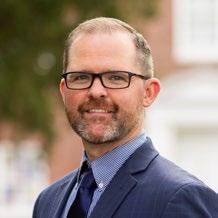
"The doctrine of the Trinity is not the specialty of experts—it is the faith of all Christians. It is the fount from which all Christian truth flows."
K YLE D. C LAUNCH
By Jacob Percy
The Southern Baptist Theological Seminary is excited to announce the launch of its new online Doctor of Philosophy in Christian Studies, further solidifying its commitment to making the highest quality theological education accessible to God-called men and women around the world. This innovative program is designed to equip students with the academic rigor and practical skills necessary for impactful ministry and scholarly contribution without the need to relocate or pause their current ministry engagements.
“Technological changes continue to adjust the world of higher education, allowing us to offer programs online at the highest quality of scholarship with the most effective distribution of opportunity,” said R. Albert Mohler, Jr., President of The Southern Baptist Theological Seminary. “I am excited to announce that these changes allow us to introduce the new online Ph.D. in Christian Studies, which marks another innovative step in our goal to deliver accessible, world-class theological education.”
Southern Seminary introduces the online Ph.D. in Christian Studies as part of their commitment to providing accessible, high-quality theological education to ministry leaders and pastors worldwide. This program is uniquely designed to accommodate those who are passionate about deepening their scholarship even as their current context does not allow them to travel to Louisville for doctoral studies by providing a fully online format, allowing students to balance their academic pursuits with their ministry responsibilities.
The curriculum spans multiple disciplines, from biblical and theological studies to practical theology, ensuring a comprehensive academic experience that prepares students for the diverse challenges of contemporary ministry. This multidisciplinary approach reflects Southern Seminary’s dedication to equipping leaders for effective teaching, advanced scholarship, and missional service. By offering this program online, Southern Seminary aims to extend the global reach of the degree, making it possible for students everywhere to benefit from the rigorous academic training that Southern Seminary is known for.
Southern Seminary’s new online Ph.D. continues the institution’s legacy of academic excellence and theological depth, now offered with unmatched flexibility. Live
online lectures and comprehensive evaluations are part of a learning experience designed to maximize accessibility. Students in this program will continue to be guided by the supervision and mentorship of Southern Seminary’s renowned faculty and complete a scholarly dissertation in a specific research area.

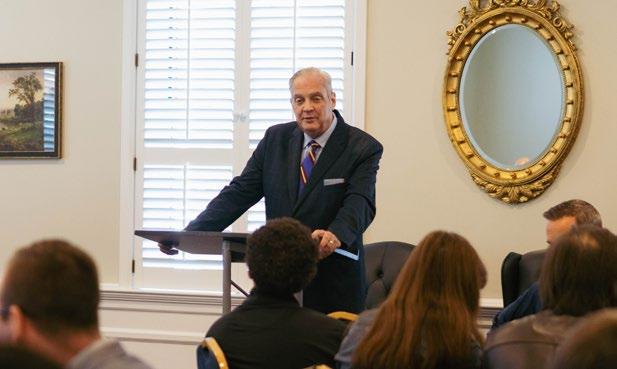
By Travis Hearne
Southern Seminary hosted students from 20 states for the first Experiential Modular. These 8-week online courses bring students to campus for three days to engage face-to-face with their professors, connect with peers, and participate in campus activities.
Brian Renshaw, Associate Vice President for the Global Campus at SBTS, says the new Experiential Modular courses combine the flexible and relational components of education many online students seek. “The Experiential Modular offers online students a unique chance to visit campus for three days and earn course credit, all while Southern Seminary covers their hotel and meals,” Renshaw said. “Before and after their visit,
students will complete coursework online. The on-campus experience aims to immerse students in the classroom with their professor and other students, experience campus life, and foster stronger connections with faculty and fellow online students.”
The Experiential Modulars emerged because distance students may need help connecting with the campus community and cultivating meaningful relationships with professors and students. Renshaw says intentional time on campus through these Experiential Modular courses makes flexible education more than just watching lectures.
“While the flexibility of online education is great, it is difficult to establish and continue meaningful relationships purely through online classes,” Renshaw said. “Often, online students feel isolated in their studies because they are the only ones pursuing any sort of theological education in their lives. Additionally, fostering a meaningful relationship with the professor is difficult in the online context. We needed a way to provide
opportunities for students to gather and form meaningful connections with faculty, other students, and Southern Seminary. We wanted to create an opportunity beyond just attending in-class lectures.”
The inaugural classes for the Fall 1 term successfully met these goals, and students commended their time on campus. “Connecting with other students and the professor through real discussion in the classroom was a night and day difference from merely studying online,” said Zach Kelly, an M.Div. student from St. Augusta, Florida.
Emily May, of Milledgeville, Georgia, enrolled in Jeremy Pierre’s course “Practical Theology in Context.” She said the time on campus exceeded her expectations and was an excellent option for pursuing a degree in biblical counseling in her context.
“I felt more connected to the seminary community than ever before,” May said. “The experience exceeded my expectations.”
Renshaw anticipates similar responses and participation in the next on-campus portions of the Experiential Modulars. He encourages all distance learning students to register for an Experiential Modular course to enhance their online education.
“This is a great opportunity for students to supplement their online education,” Renshaw said. “Talking with students who just attended our first one, all of them said something to the effect that they felt more connected with other students. They were encouraged by the classes and the time provided to connect with other students who are taking online courses and engaging in various ministries.”
By Chip Hutcheson, Kentucky Today
Golfers and donors at the 21st annual Heritage Classic Golf Tournament Monday gave $285,000 to benefit students at The Southern Baptist Theological Seminary. That money will go toward helping keep tuition rates as low as possible for students entering gospel ministry.
A total of 22 teams competed at Big Spring Country Club, and Dr. R. Albert Mohler, SBTS president, thanked golfers and donors for their investment “for a cause, a mission, for the glory of God.” Mohler added that the impact of the money raised will result in “preachers reaching people with the gospel,” adding that “you are doing something impactful here and for eternity. Between now and eternity, we have a lot of work to do.”
Since the inception of the Heritage tournament, $2.5 million has been raised for the purpose of funding gospel ministry.

Edward Heinze, vice president for institutional advancement, presented the $5,000 Rick Bordas Memorial Scholarship to Eric Rosson, a native of Hillsboro, Texas, who is pursuing his MDiv, concentrating in the biblical languages and biblical theology.
Rosson is a graduate of the University of Texas at Dallas with a bachelor’s degree in human resources management. He currently work in the SBTS housing office.
Rosson told the crowd that he was saved in college, and then was

in a one-year ministry training program at a Texas church. “It was there I realized I needed to know much more,” he said, prompting him to visit Southern, where he said he “fell in love with the faculty and teaching that was so formative.” He added, “On behalf of folks you will never see, hands you will never shake and voices you will never hear, thank you.”
Accompanying him was his wife, Matti, a native of Clovis, N.M., who graduated from Texas Tech University with a bachelor’s degree in media relations and a minor in public relations. She currently works in the campus admissions office while pursuing her master’s degree in biblical counseling at SBTS.
Bordas was a long-time SBTS friend who died in 2013. His family established the scholarship to help men prepare for pulpit ministry. Since its inception 10 years ago, $50,000 has been awarded to SBTS students.
By Jacob Percy
Over 960 alumni and other guests gathered at The Southern Baptist Theological Seminary’s annual Alumni and Friends Luncheon at the Southern Baptist Convention in Indianapolis, IN. The luncheon was a time of joyful fellowship and celebration of the Lord’s faithfulness to Southern Seminary, experiencing record summer enrollment, and had 581 students representing 28 countries graduate from Southern Seminary and Boyce College last month.
President R. Albert Mohler, Jr. presented this year’s Alumnus of the Year Award to Dondi E. Costin, a two-time graduate of Southern Seminary and the recently elected president of Liberty University in Lynchburg, VA. Mohler said, “I had the opportunity to speak in chapel convocation at Liberty just a over a month ago as an incredible experience, and I saw firsthand Dr. Costi’s leadership there, and I just drew encouragement from every aspect of my visit… Dr. Costi was made for this leadership.”
President Mohler honored outgoing Trustee Chairman and Southern Alumnus Joshua W. Powell, Pastor of Taylors Baptist Church in Taylors, SC.
During his update to the alumni, Mohler highlighted that this upcoming year will mark the thirtieth anniversary of establishing the Billy Graham

School of Missions, Evangelism, and Ministry. Reflecting on Billy Graham’s personal investment in Southern Seminary, Mohler said, “Dr. Graham spoke to me, and he said, I think your opportunity is the opportunity to save this school. I don’t think there’ll be another opportunity. He told me he had two of my associates whose sons had gone to Southern Seminary and became theologically confused in a way Dr. Graham clearly understood, which was a great tragedy. And he said, ‘It’s your job to fix it.’ And then what came naturally to me was, I need your help.” Billy Graham proceeded to help by endorsing Mohler as the right candidate to lead Southern Seminary, speaking at Mohler’s inauguration, and giving his name to the formation of a new graduate school at Southern Seminary, The Billy Graham School of Missions, Evangelism, and Ministry. Graham’s support and the formation of the
Billy Graham School were critical to recovering confessional integrity at Southern Seminary.
Mohler concluded his remarks with strong reassurance, “I’m able to tell you financially, by God’s grace, by the generosity of Southern Baptists, and the generosity of friends and the strength of the program, we’re strong. In terms of academic reputation, the institution is strong. In terms of our fulfillment of the mission that Southern Baptists have given to us by God’s grace, strong.”Mohler continued, “The proof of that is not primarily on the campus. The proof of that is on the mission field. The proof of that is in young church plants all over the United States. The proof of that is in pulpits across this land in various areas of ministry and mission where our students are leading and with the college students in so many different arenas of the life.”
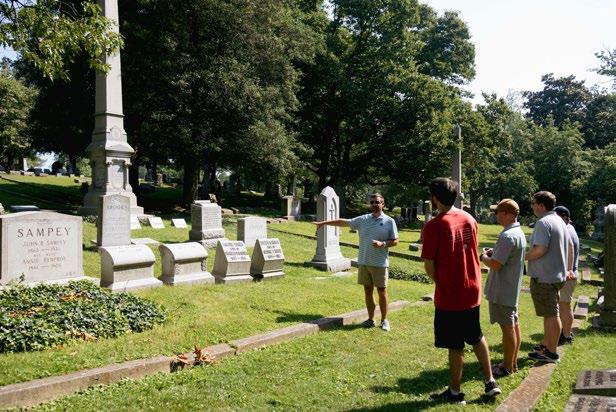
Honoring Legacy:
By Travis Hearne
On a blistering summer Saturday morning, Anne Greenwalt, an MDiv student at The Southern Baptist Theological Seminary, got in her car and drove four hours to Louisville, KY.
Her drive from outside of St. Louis was worth it because she wanted to experience part of Southern Seminary’s story —a story she actively participates in. Greenwalt and several other students from Southern Seminary, Boyce College, and others in the community arrived at the library early that morning to embark on a tour of Cave Hill Cemetery.
But what does this famous cemetery in the heart of Louisville, KY, have to do with Southern Seminary’s story? Jake Stone,
Research Expert at Southern Seminary’s library and the guide for the tour, had much to say to that question.
What is Cave Hill Cemetery, and what does it have to do with Southern Seminary?
Cave Hill is one of the largest, and it is one of the oldest cemeteries in the region. It is home to many titanic citizens like Colonel Sanders and Muhammad Ali, but it is also intertwined with the history of the Southern Baptist Theological Seminary. Our founding faculty, three of them, James Petigru Boyce, John Broadus, and Basil Manley Jr., are buried out there, and the first professor who ever died while serving on faculty George W. Riggan.
Cave Hill is a place where individuals who want to understand the history and story of Southern Seminary can actually walk and travel from plot to plot to see the twists and turns that have taken place in the history of our seminary.
Why did the library start offering tours?
As Dr. Michael A.G. Haykin puts it, as Baptists, if we don’t tell our story, no one will. Or if they do, they’ll mess it up. And so we have a responsibility to steward the history and heritage passed on to us. I have deeply loved Baptist history for a long time, and being a part of this community is a gateway into the richness of Baptist and Southern Baptist history. As the seminary’s library, we have a unique role as caretakers of the institution’s history and want to offer more about the history and story of Southern Seminary.
Understanding Southern Seminary’s legacy through the tours of Cave Hill Cemetery can serve two purposes. First, it reminds us of all of our mortality. We all do have an appointment with death, and we should strive to run the race well that Christ has set before us. Second, we need to understand that in our current moment, we’re not here by accident. Men and women who sacrificed much have gone before us. Some of the history is good, and some of it’s not so good, but all of it has fashioned us to this moment. Just like in our family histories—so it is with the seminary’s history.
Why should students and the community care about the history of Southern Seminary?
When you enroll to go to Boyce College or Southern Seminary, you enroll at an institution with a long history and story. You’re now a part of that story. If you want to be a good witness in that story, then it would be wise for you to know those who have gone before you.
It gives you a greater appreciation for where you have chosen to study. Dr. Timothy George, who taught church history at Southern Seminary, said his job was to show students that something happened between Jesus Christ and their grandma, which still matters in 2024. We are recipients of what happened in 1859, and we enjoy what we enjoy here at Southern because of what’s happened in the past 165 years.
What can students expect on the tour, when is the next one, and why should someone sign up?
We do it on Saturdays, so there will be one a month in the semester. It’s usually around two hours. We’ll hit six spots. The seminary owns three plots, home to either presidents or faculty members. Then, we will show some of the other SBC history connections. For example, the first president of the Sunday School Board, which is now Lifeway, is buried at Cave Hill. I try to mix in facts and stories because history is more than just names, dates, and places. These are real people. We would not want anybody to describe us and say merely that we were born on this date and in this location, and then we died here and did one or two things. We need to understand some of the flavor and color behind these individuals.
If you want to step back in time for a moment and realize the exciting figures that have been part of this campus’s history, come out to Cave Hill and journey with us.
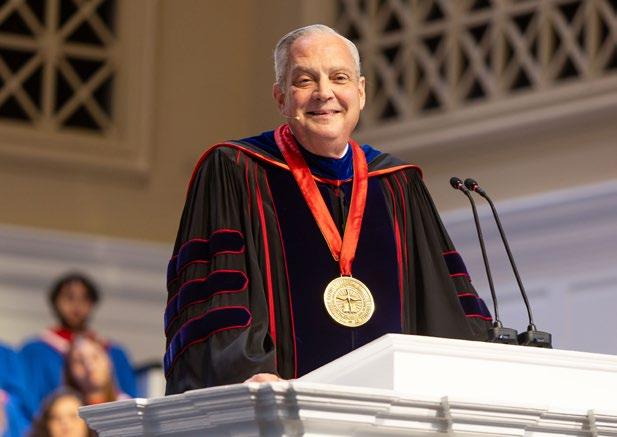
By Jacob Percy
“Things once hidden are now the things we teach and learn,” President R. Albert Mohler, Jr. declared to an Alumni Chapel teeming with students and faculty eager to start the 2024 Fall term at The Southern Baptist Theological Seminary and Boyce College. This convocation service inaugurated a new academic semester, celebrating the new and grounding all the work of the seminary and college in the old, unchanging Christian faith.
President Mohler said, “This is an institution established in the year 1859 proudly upon a succession of faithful teaching going all the way back to the apostles and to Christ. There is new here, but it is an intersection of new and old.” He
continued, “I just want to tell you, especially for those who are on this faculty, this is a day that brings us very great joy and it’s a reminder of God’s promises known new students from many different states and from many different countries.”
President Mohler’s convocation address was delivered with joyful confidence as he set the tone for the new term, emphasizing the institution’s mission to glorify God through teaching, learning, and fellowship. Speaking to the task of the institution, Mohler said, “I am thankful for the fact that we don’t have to gather together just to talk about what to teach… or just to remind ourselves why we teach. Now, we do remind ourselves of these things, but we do so seeking the best we know to be in continuity with every faithful generation in the history of the Christian Church.”
Preaching from Matthew 13:35, Mohler emphasized that the mysteries once hidden have

now been revealed to us through Christ and his coming. It is on the basis of the authority and power revealed in Christ that those at Southern Seminary and Boyce College have a stewardship to truth revealed. Mohler said, “It is about our faithful stewardship. That’s what we are committing ourselves to in this service as teachers and learners together. The faithful
stewardship.” He continued, “This means that what we’re about here is not just a Christian education as if Christian’s a modifier. It’s a Christian education as in Christian truth is the whole point. Christian faithfulness is the entire point.”
During the service, four Southern Seminary and Boyce College professors signed the Abstract of Principles, the seminary’s founding confession of faith: Dustin Bruce, Associate Professor of Christian Theology and Church History, and dean of Boyce College, Mattew Haste, Associate Professor of Biblical Spirituality and Biblical Counseling, Andrew Walker, Associate Professor of Christian Ethics and Public Theology, and Matthew Westerholm, Professor of Church Music and Worship becoming the 281, 282, 283, and 284 signers respectively.
By signing the Abstract of Principles, professors pledge to teach its doctrines “without hesitation, mental reservation, or any private arrangement” with the seminary leadership. While all faculty members sign the abstract before they begin teaching, those elected by the Board of Trustees sign the original document
with ink and quill, symbolizing their full commitment to this foundational confession.
Also during the service, Mohler introduced two new faculty members: Clint Armani, Associate Professor of Mathematical Sciences and Colin McCulloch, Assistant Professor of Biblical Counseling and Practical Theology.
The opening convocation was also the occasion for the seminary to welcome three new members of its trustee board: Lucas Almeida of Palm Bay, FL, David Beck of Louisville, KY, and Clay Smith of Marietta, GA.
Concluding the convocation service and sending faculty and students to their work for the semester Mohler charged, “Our privilege is to turn together to learn dark sayings from old, things hidden from the foundation of the world. Isn’t that something? Isn’t that breathtaking? Don’t you want to get to it every day? Every class is joyful. We get to see them, to hear them, to learn them, to teach them, to live them, to pass them on to our children, to sing them as hymns, to exult in them. So, let’s get to it. Let’s get to it with joy. Let’s get to it to the glory of God.”
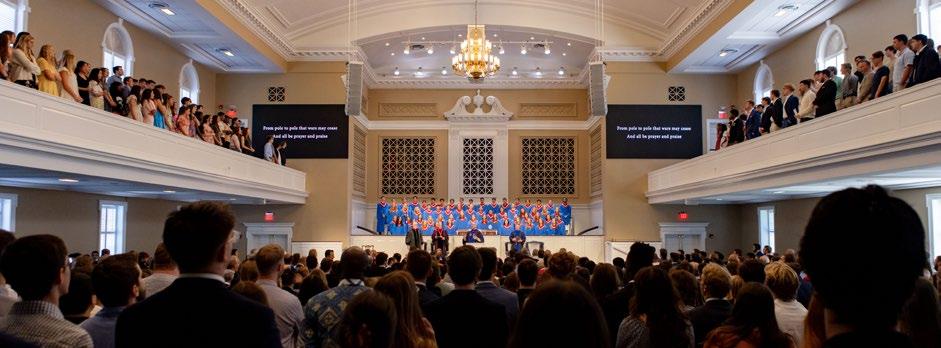
FROM THE AMAZON TO THE HIMALAYAS, GOD IS ACCOMPLISHING HIS MISSION.
SUBSCRIBE NOW ON SPOTIFY OR ITUNES


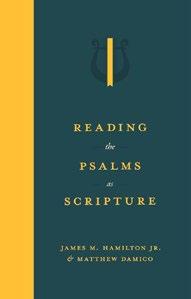
Reading the Psalms as Scripture
James M. Hamilton Jr. and Matt Damico Lexham Press, 2024 | $13.99

Good News for All the Earth: Understanding the story of the New Testament
Mitch Chase 10ofThose, 2025 | $9.99

Songs of the Son: Reading the Psalms with the Author of Hebrews
Daniel Stevens Crossway, 2025 | $13.99
James M. Hamilton Jr. and Matthew Damico guide the reader to delight in the spiritual artistry of the psalms. Psalms is a carefully arranged book saturated in Scripture. The psalmists drew from imagery and themes from earlier Scripture, which are then developed by later Scripture and fulfilled in Christ.
The New Testament reports the arrival of God’s promised deliverer. In several Gospels, a book of early church history, many letters, and a visionary book of judgment and hope, we learn about the ministry and mission of Jesus and the lives of those who followed him. The Old Testament contained the shadows and patterns and prophecies that anticipated the Christ, and the New Testament announces that the Light of the world has come.
The book of Psalms expresses our human experiences through its beautiful prose. But this Old Testament book is more than just relatable poetry—it reveals a rich theology of God, the nature and work of Jesus, and Christ’s voice hidden in Scripture. The Psalms are the songs of the Son.

What Do I Say When...?: A Parent's Guide to Navigating Cultural Chaos for Children and Teens
Andrew T. Walker and Christian Walker
Crossway, 2024 | $16.99
Written by husband and wife duo Andrew and Christian Walker, this accessible and trusted guide helps busy parents quickly and effectively respond to their children’s questions on a wide range of topics, including abortion, sexuality, transgenderism, technology, political engagement, and more.
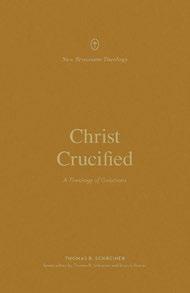
Christ Crucified: A Theology of Galatians
Thomas Schreiner
Crossway, 2024 | $24.99

The Divine Christology of the Apostle Paul
Thomas Schreiner
IVP Academic, 2024 | $29.99
In this addition to the New Testament Theology series, scholar Thomas R. Schreiner addresses the conflict between Paul and his opponents in Galatia, examines the gospel itself, and shows what it looks like to live out the truth of the gospel in the new era. After examining the dominant biblical-theological themes of Galatians, readers will be reminded of the gift of grace Christ offers through his death on the cross—the only possible path to salvation and true unity among believers.
The last fifty years of Pauline scholarship have provided numerous insights to both the academy and the church. While the landscape is rich with scholarly findings, it can be overwhelming to navigate the complex lines of argumentation and the interactions between various key scholars. In The Divine Christology of the Apostle Paul, biblical scholars Chris Bruno, John Lee, and Thomas Schreiner explore the more detailed and often perplexing conversations concerning the divinity of Christ, bringing helpful guidance and clarity to scholars' various articulations.
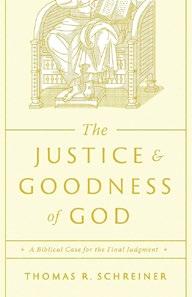
The Justice and Goodness of God: A Biblical Case for the Final Judgment
Thomas Schreiner Crossway, 2024 | $17.99
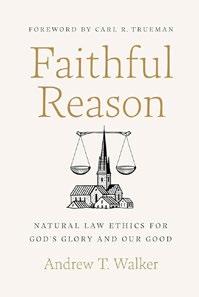
Faithful Reason: Natural Law Ethics for God's Glory and Our Good
Andrew T. Walker
B&H, 2024 | $34.99
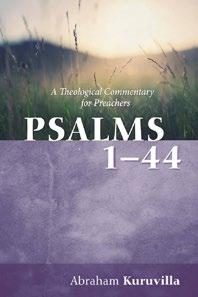
Psalms: A Theological Commentary for Preachers (3 Vol.)
Abraham Kuruvilla Cascade Books, 2024 | $39.00
In his book The Justice and Goodness of God, theologian Thomas Schreiner offers a comprehensive, biblical analysis of eternal destruction. Explaining that “final judgment doesn’t contradict God’s goodness but verifies and displays it,” he examines themes of sin, death, and redemption in the New Testament and other passages of Scripture.
In Faithful Reason: Natural Law Ethics for God’s Glory and Our Good, Andrew T. Walker argues that developing a comprehensive Christian ethic is not simply a matter of appealing to biblical authority, but also of understanding the way that God has ordered creation and our place within it. In this work, he provides a comprehensive and accessible introduction to natural law ethics from an evangelical perspective.
While the primary goal of the commentary is to take the preacher from text to theology, it also provides a sermon outline for each of the preaching units in the Psalms. The unique approach of this work results in a theology-for-preaching commentary that promises to be useful for anyone teaching from the Psalter with an emphasis on application.
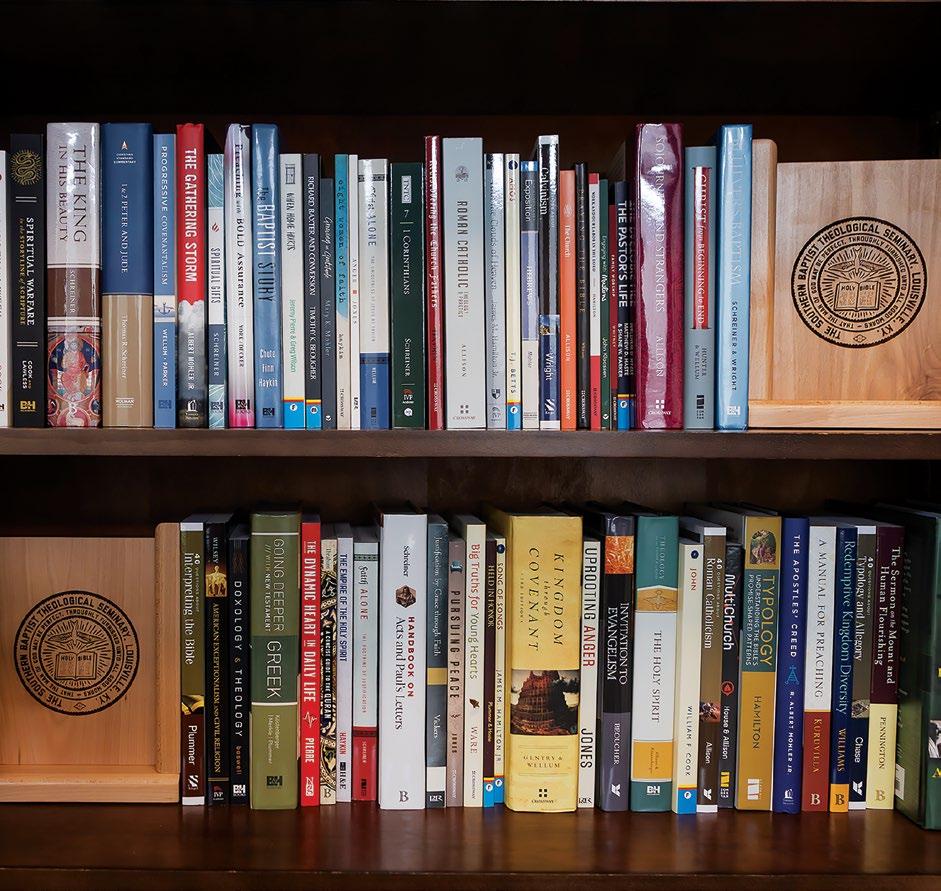
Visit the Bookstore at Southern, the largest theological bookstore in North America. From biblical commentaries to church history, we have everything you need to deepen your love of God and his Word and build your library. Our collections range from the newest releases to an extensive collection of high-quality used books!
BY TRAVIS HEARNE
How have I been doing ministry for 20 years without this?!” Michelle Helmkamp said after taking her first course at The Southern Baptist Theological Seminary.
Michelle is finishing up her Master of Arts in Biblical Counseling at Southern Seminary, but her journey into theological education came thirty years after her last formal class. So, what made her want to pursue an advanced seminary degree at age fifty and with twenty years of ministry experience? All it took was a little nudge from her son, and she was hooked.
Mitch Helmkamp, Michelle’s son, recently graduated from Southern Seminary and is currently serving as Director of Theological Development at Gospel
City Church in Granger, Indiana—the same church his mom has been directing children’s ministry at for twenty years.
“MY MOM HAS BEEN SERVING IN KIDS MINISTRY AND WOMEN’S MINISTRY FOR MOST OF MY LIFE,” MITCH SAID. “SHE’S ALWAYS BEEN A DILIGENT STUDENT OF GOD’S WORD, A VERACIOUS READER, AND LOVES TO CONSUME THEOLOGICAL PODCASTS. BUT SHE HAD NEVER RECEIVED ANY FORMAL TRAINING.”

Mitch knew his mom would not only benefit from taking a class at Southern Seminary but knew she would also love it.
“I figured that if she was already spending so much time reading and learning, then she might as well study under the best professors,” Mitch said. “She could be guided regarding what to read, what content to study, and learn more precisely what to believe.”
MICHELLE WAS INTIMIDATED AT FIRST BUT ADMITS MITCH WAS RIGHT. SHE HAD NO IDEA HOW MUCH SHE WOULD LOVE TAKING CLASSES AND HOW BENEFICIAL THE ONLINE PROGRAM WOULD BE FOR HER OWN MINISTRY.
“I enrolled in Dr. Claunch’s systematic theology class,” Michelle said. “My son was right—I loved it! I have found it particularly amazing to be in a ministry role while getting my seminary education. I have implemented several changes in how we do ministry
with our kids that were a direct result of my classes. I have found that God has been in the timing of each class, enriching the work that I do as a teacher of children and women and in counseling. It has been fun to see how God has even been in the order and timing of the classes as they have correlated with what was going on in my church.”
Mitch recognizes how seminary has refined his mom’s theological understanding and effectiveness in ministry. Even though she had spent her whole adult life serving kids, education, and local church ministry, seminary helped open new opportunities and produce better fruit.
“I have to admit it is pretty funny to have conversations with my mom about the baptism of the Holy Spirit, reprobation, and different views on the atonement,” Mitch said. “But the most encouraging thing is seeing how her training is bearing immediate fruit in our church’s children’s ministry. Theology is not just for pastors and adults; the kids love it! Southern Seminary has equipped my mom to write her own children’s curriculum that is deep, biblical, and age-appropriate
without watering down the truth. She also equips the parents to disciple their kids and even helps write and lead Sunday night children’s classes which survey systematic and biblical theology.”
The online degree from Southern Seminary was perfect for Michelle because she remained in her ministry context while receiving the same caliber of training as on-campus students.
“I am thankful for the opportunity to do online learning with such excellence,” Michelle said. “At this stage of my life, married and already rooted in ministry, there would have been no way to get an education like this if it required moving to Louisville, Ky. Online education has helped me stay plugged into my church and continue to serve my family with the least amount of disruption.”
Along with growing in her confidence and knowledge of God’s Word, Michelle continues to be encouraged by the benefits seminary offers other women like her and those not pursuing the pastorate.
“I have been so encouraged at the number of women attending—especially in the biblical counseling classes. It is wonderful to have women being trained to come alongside the elders and pastors in the church, supporting them with a fuller understanding of God’s Word. This can only make the church stronger. As women teach other women and children, we need them to be as biblically accurate as we would want the other areas of our church to be.”
Seminary education has even helped expand Michelle’s ministry roles, as she now uses her biblical counseling experience in her local context.
“Before seminary, I was officially the Director of Children’s Discipleship. However, we have a healthy Biblical Counseling Ministry at our church, and as women needed care through counseling, I would sit with them and pray for them as they met with our pastor. This sparked an interest in me I saw the great need to meet people in their suffering with the hope of the Gospel. Now I am better equipped to apply God’s Word to these women.”
Training ministers to apply God’s Word is at the heart of Southern Seminary’s mission, and why Provost Paul Akin points to Michelle’s story as paradigmatic for any Christian wanting to better serve their church through the benefit of theological education.
“WE EXIST TO SERVE CHURCHES,” AKIN SAID. “ONE OF THE MOST EFFECTIVE WAYS FOR US TO SERVE CHURCHES IS TO MAKE THEOLOGICAL EDUCATION
ACCESSIBLE FOR PEOPLE LIKE MICHELLE.
As a wife and mother, she had engaged in women’s and children’s ministry for over 20 years, but she wanted to grow and learn more. With Southern Seminary Online, she can grow in her knowledge of the Bible and discipleship while remaining engaged in ministry in her local church. Her life is a testimony that Jesus’ command to love God with all your heart, soul, mind, and strength applies to men and women in every walk of life regardless of age or stage in life.”

THE CHURCH NEEDS YOU. YOU NEED TO BE EQUIPPED.
Your children are raised, and your career is complete. Serve Christ and his church even more effectively during retirement by earning the theological degree you’ve always wanted.

Explore the 1, 2, or 3 year Southern Seminary degree options that are redefining retirement:
SBTS.EDU/FINISHWELL
a
THE HIGHEST LEVEL OF SCHOLARSHIP FROM A FACULTY WITH UNMATCHED MINISTRY EXPERIENCE.
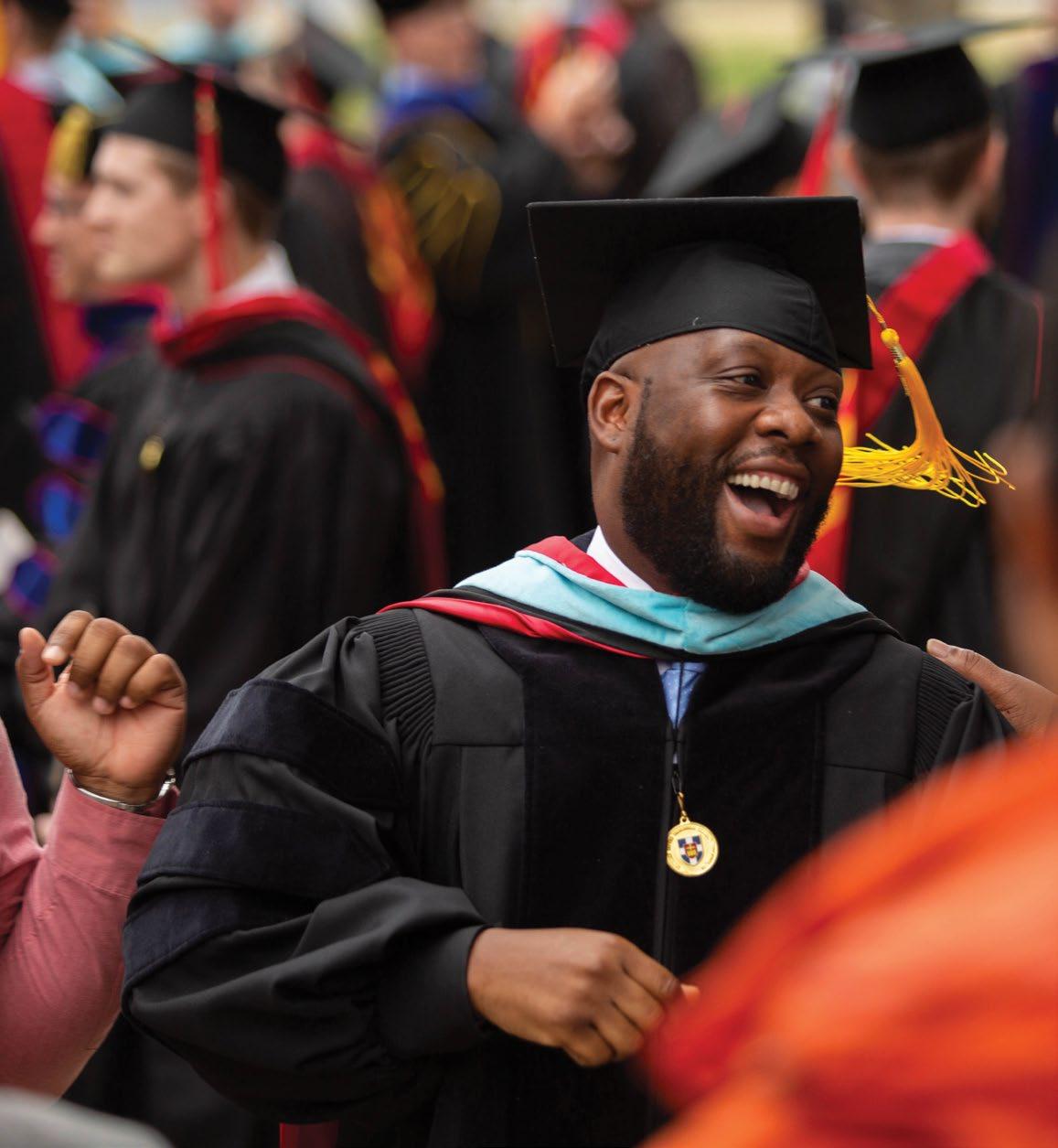
Explore your options and find the perfect fit for your ministry with our DOCTORAL DEGREE FINDER TOOL
BY MATTHEW D. HASTE
At the close of each academic year, the six seminaries of the Southern Baptist Convention confer degrees upon hundreds of graduates, including dozens who receive a Doctor of Ministry. Most of these DMin graduates will take their new diploma home, perhaps hang it on an office wall, and then get back to work doing the same ministry they were doing at the beginning of their program. If that is the case, you might wonder what a Doctor of Ministry is designed to accomplish. Though seminaries have been awarding this degree for over fifty years, the purpose of the DMin is not as well-established as other degrees.
In fact, when the Doctor of Ministry first became popular in American seminaries, a leading scholar questioned the legitimacy of the degree and expressed concern over the “D-Min-ization of the ministry.”[1] David Wells should be commended for both his memorable quip and his cogent critique of various poor reasons to pursue the degree. I heartily agree with Dr. Wells that no one should seek a DMin to attain professional status, to alleviate a sense of inferiority among others, or to chart an easier path to obtaining a doctoral title.
If your motivation for pursuing a DMin sounds like that list, I would encourage you to stop reading this article and get back to the work of ministry. But might a DMin help increase your capacity for that work? Could a professional doctoral degree strengthen areas of weakness or deepen your theological understanding in ways that might make you a better pastor? I believe it can. As someone who works closely with DMin students at The Southern Baptist Theological Seminary, I want to offer several reasons why pastors could benefit from pursuing a Doctor of Ministry.
First, it may be helpful to clarify the formal purpose of the degree. The DMin is an advanced professional degree designed for pastors and ministry leaders who want to build upon the foundational training of their master’s program and the accumulated wisdom of their own ministry experience. It was originally introduced as a means of serving churches by offering clergy the opportunity for continuing education. A typical DMin program will include coursework in an area of specialization as well as a capstone project that applies academic research to the student’s ministry context. Such programs are designed for part-time study alongside ongoing ministry responsibilities and can typically be completed in around three years.
So why should you consider pursuing a Doctor of Ministry? Here are five benefits I have observed in the lives of my students.
The term professional has both positive and negative connotations. No, brothers, we pastors are not professionals, but thoughtful attention to the practical challenges of ministry can be used by God to produce a more effective pastor. Training and secularization are not synonymous. That is why John Piper closed his excellent book about the dangers of professionalism in ministry with an exhortation to pray for faithful seminaries.[2] The antidote to professionalization is not the absence of training, but better training aimed at equipping ministers to rightly handle the Word of truth (2 Tim 2:15) in the power of the Spirit. A well-designed DMin program should deepen your theological convictions and expand your competency, while reinforcing the importance of depending upon God “who gives the growth” to your ministry (1 Cor 3:7). This development takes place through both the coursework and your interactions with fellow ministry practitioners, who are often facing similar challenges in their own ministries.
Imagine applying the work of several years of supervised research toward a particular problem in your church. That is what most DMin students do in their capstone project. The goal is theological integration combined with contextualized application. At SBTS, our students begin their projects in their first month of the three-year program by answering a simple question: What needs to change in your ministry context? That answer is then expanded over several years through extensive research into the biblical and theological foundations of the issue, exploration of relevant historical and practical considerations, and the formal implementation and evaluation of a particular ministry initiative. Students are strengthened in the work of ministry and churches are the beneficiaries, as their research is applied to their own ministry context.
Some DMin students are motivated by a sense of stewardship in service to others. They recognize that God has given them an opportunity to train others toward effective ministry and they want to be faithful to that opportunity. This reality explains why many graduates will happily continue serving in the same church after completing their program. They did not pursue the degree to advance in their career, but to make the most of their calling. This motivation is appropriate for a professional doctoral program and distinguishes the degree from a master’s program. In a master’s course, you learn how to preach and counsel and make disciples. In a doctoral seminar, you increase your knowledge so that you are better equipped to train others in such tasks.
students, this specialization is informed by either a perceived lack in their previous training (think of the pastor who wants to counsel more faithfully, but had only one counseling course in his master’s degree) or the recognition that a particular task (i.e., preaching) is so central to their ministry that they want to learn everything they can about it. In either case, a series of seminars taught by expert practitioners can be a helpful tool in continuing to grow as a pastor and leader.
2 3 4 5
A DMin can provide a way to “continue in what you have learned” (2 Tim 3:14) in a way that strengthens your convictions and helps you prepare for new challenges. A typical DMin program will provide an opportunity to choose a specific concentration or track as the focus of your coursework. For many
This specific aspiration is rarely at the top of the list for incoming students, but I have talked to many graduates who have mentioned it as one of the unexpected blessings of their program. A doctoral degree will require a great deal of writing. Along the way, you will learn better ways to craft a clear and compelling argument. The extensive feedback you receive from your faculty supervisor will often bear fruit in other areas of communication. A student recently shared with me that someone in his church had commented that his preaching had improved since he started his DMin. This is an ancillary benefit to the extensive reading and writing that you will do in a doctoral program, but it is another practical way that your degree can benefit others.
A Doctor of Ministry is by no means necessary for faithful ministry, but it can be a helpful tool. There are bad reasons to pursue any degree, but that should not stop thoughtful pastors from pursuing additional training that could strengthen them in their labors. If you sense the Lord may be preparing you for further studies beyond your master’s, you can learn more about the doctoral programs at Southern at sbts.edu/doctoral.
